Quotes
90+ Best Alan Watts Quotes and Biography
Full name: Alan Wilson Watts
Date of birth: 6 January 1915
Date of death: 16 November 1973 (aged 58)
Table of Contents
Alan Watts Quotes
Alan Watts was one of the most influential philosophers in modern history, best known for popularising eastern philosophy for a western audience. He spoke about Buddhism and how to be mindful, as well as how to live a fulfilled life. The Alan Watts quotes below represent some of his greatest contributions:
Why Man Suffers
Mans suffers because they accumulate too much stuff. It’s all nice to have, but it just weighs them down in the end. They don’t see the forest for the trees. This accumulation is an indulgence that prevents him from being content with what he already owns.
Below are some of the best Alan Watts Quotes about why man suffers.
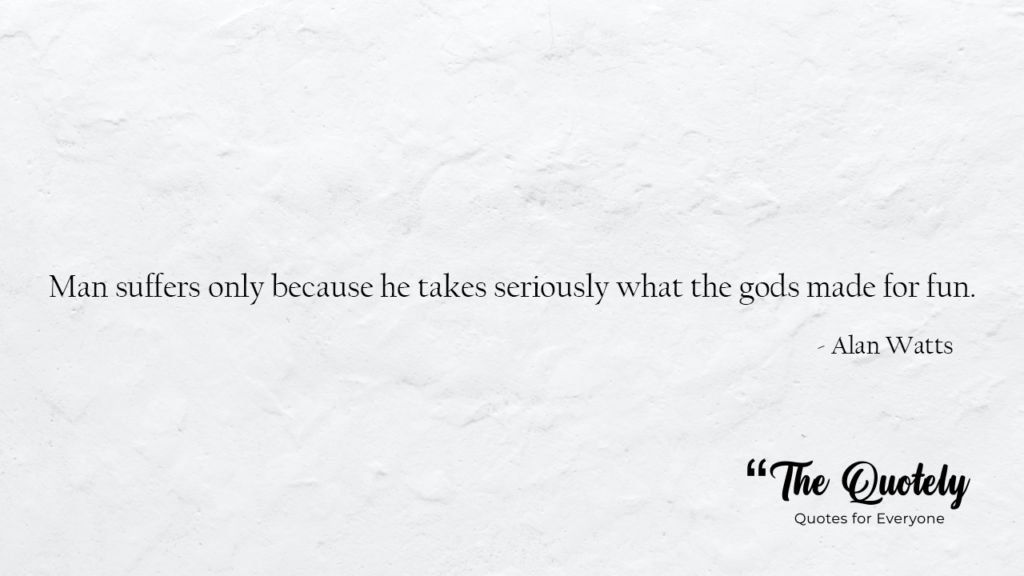
- “Man suffers only because he takes seriously what the gods made for fun.”
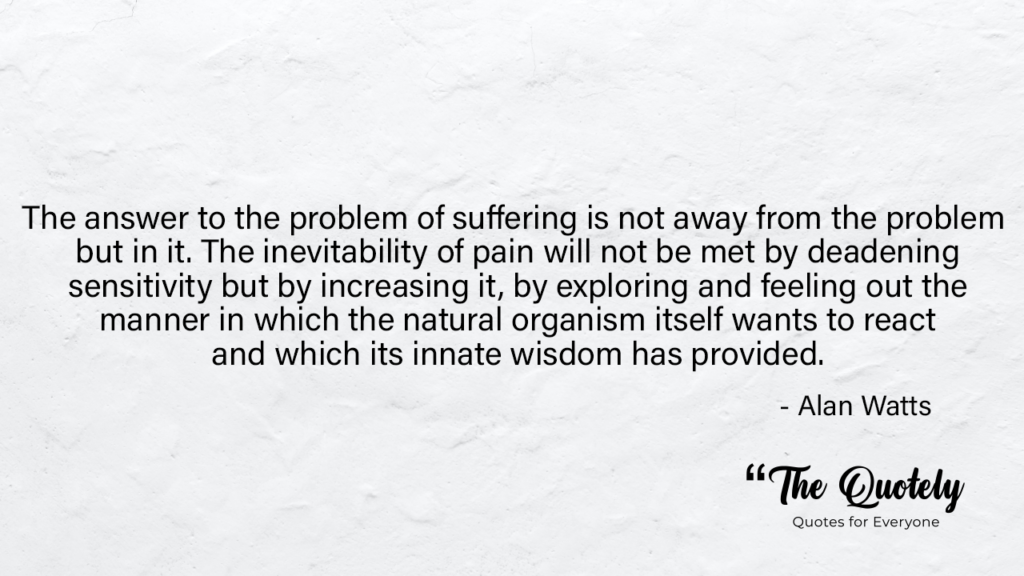
- “The answer to the problem of suffering is not away from the problem but in it. The inevitability of pain will not be met by deadening sensitivity but by increasing it, by exploring and feeling out the manner in which the natural organism itself wants to react and which its innate wisdom has provided.”

- “Like too much alcohol, self-consciousness makes us see ourselves double, and we make the double image for two selves – mental and material, controlling and controlled, reflective and spontaneous. Thus instead of suffering we suffer about suffering, and suffer about suffering about suffering.”
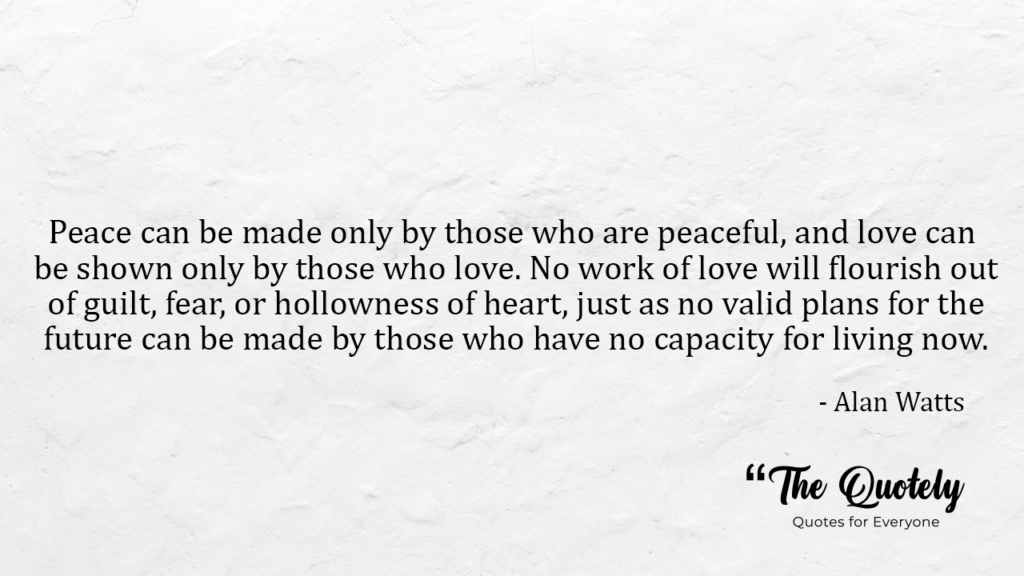
- “Peace can be made only by those who are peaceful, and love can be shown only by those who love. No work of love will flourish out of guilt, fear, or hollowness of heart, just as no valid plans for the future can be made by those who have no capacity for living now.”
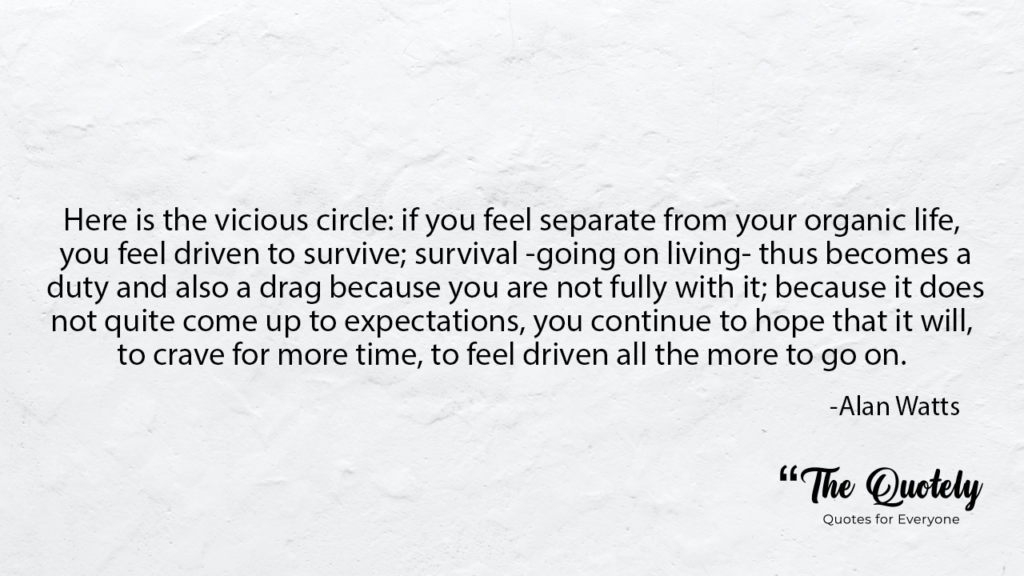
- “Here is the vicious circle: if you feel separate from your organic life, you feel driven to survive; survival -going on living- thus becomes a duty and also a drag because you are not fully with it; because it does not quite come up to expectations, you continue to hope that it will, to crave for more time, to feel driven all the more to go on.”
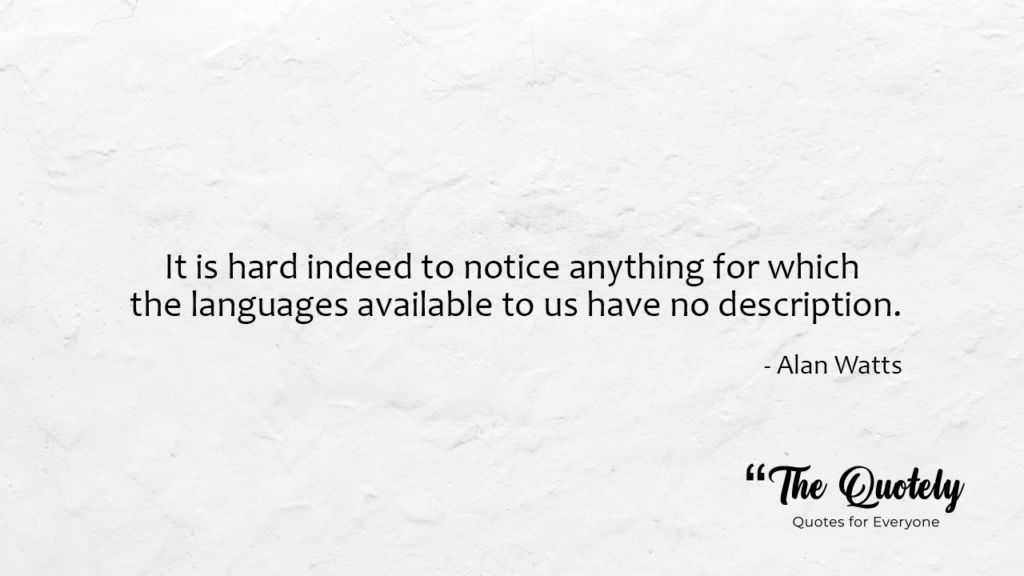
- “It is hard indeed to notice anything for which the languages available to us have no description.”
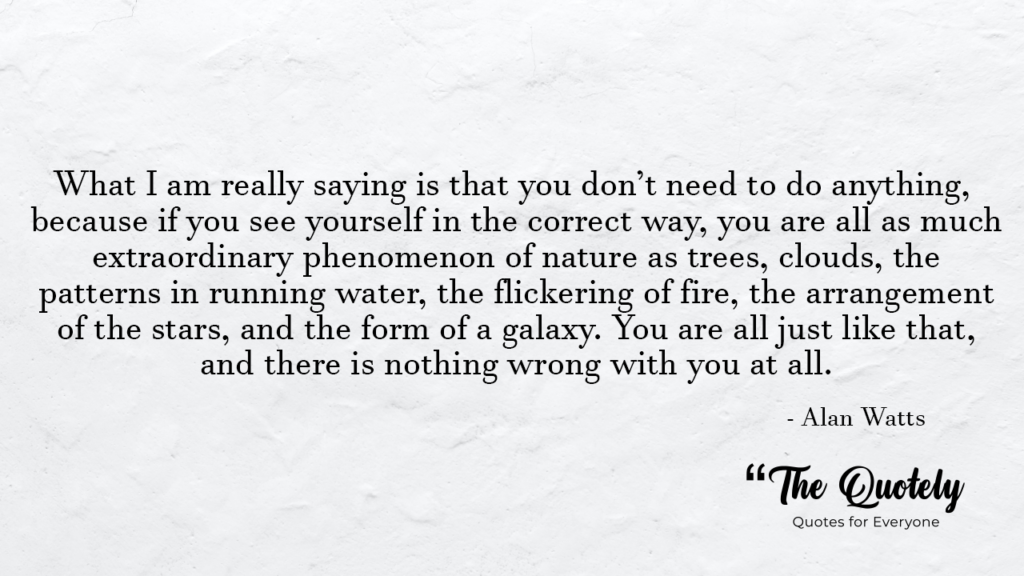
- “What I am really saying is that you don’t need to do anything, because if you see yourself in the correct way, you are all as much extraordinary phenomenon of nature as trees, clouds, the patterns in running water, the flickering of fire, the arrangement of the stars, and the form of a galaxy. You are all just like that, and there is nothing wrong with you at all.”
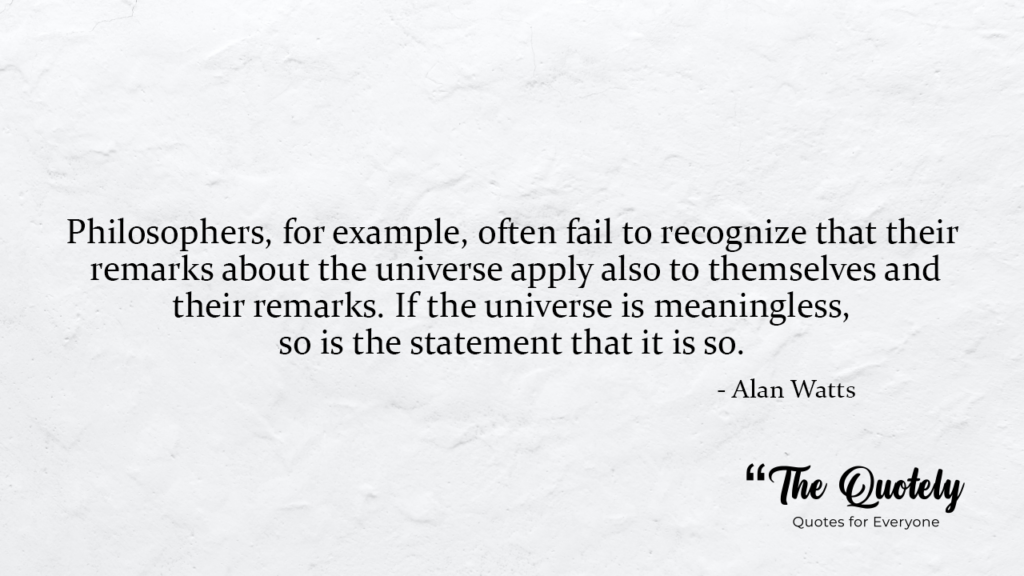
- “Philosophers, for example, often fail to recognize that their remarks about the universe apply also to themselves and their remarks. If the universe is meaningless, so is the statement that it is so.”
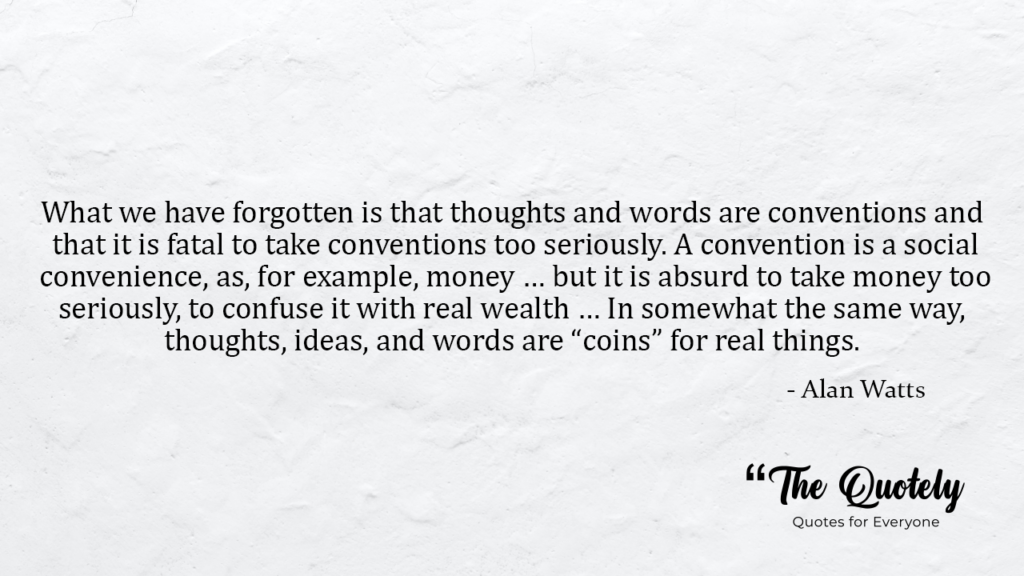
- “What we have forgotten is that thoughts and words are conventions and that it is fatal to take conventions too seriously. A convention is a social convenience, as, for example, money … but it is absurd to take money too seriously, to confuse it with real wealth … In somewhat the same way, thoughts, ideas, and words are “coins” for real things.”

- “The centipede was happy, quite, Until a toad in fun Said, ‘Pray, which leg goes after which?’ This worked his mind to such a pitch, He lay distracted in a ditch, considering how to run.”
At the present moment
Life exists only at the moment that it has been carved out by our perceptions seeing things one way or another. In those moments, we can feel its eternal presence in the ever-changing now.
Yet, each of these moments are unique and apart from one another. These quotes about “At the present moment” will surely make you think about the present moment is the only thing that matters, not the past or future.

- “This is the real secret of life — to be completely engaged with what you are doing in the here and now. And instead of calling it to work, realize it is played.”
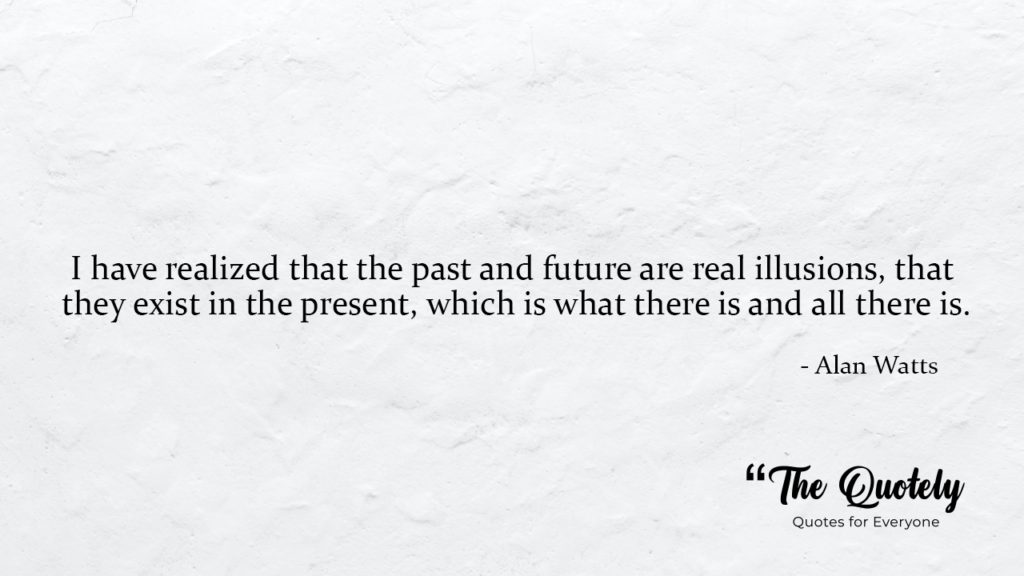
- “I have realized that the past and future are real illusions, that they exist in the present, which is what there is and all there is.”
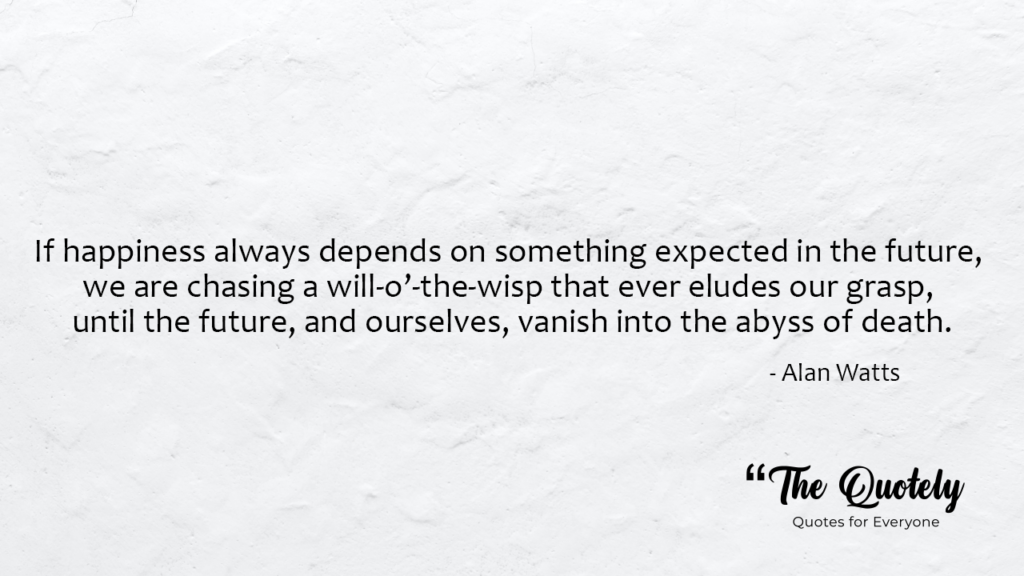
- “If happiness always depends on something expected in the future, we are chasing a will-o’-the-wisp that ever eludes our grasp, until the future, and ourselves, vanish into the abyss of death.”

- “The art of living … is neither careless drifting on the one hand nor fearful clinging to the past on the other. It consists in being sensitive to each moment, in regarding it as utterly new and unique, in having the mind open and wholly receptive.”
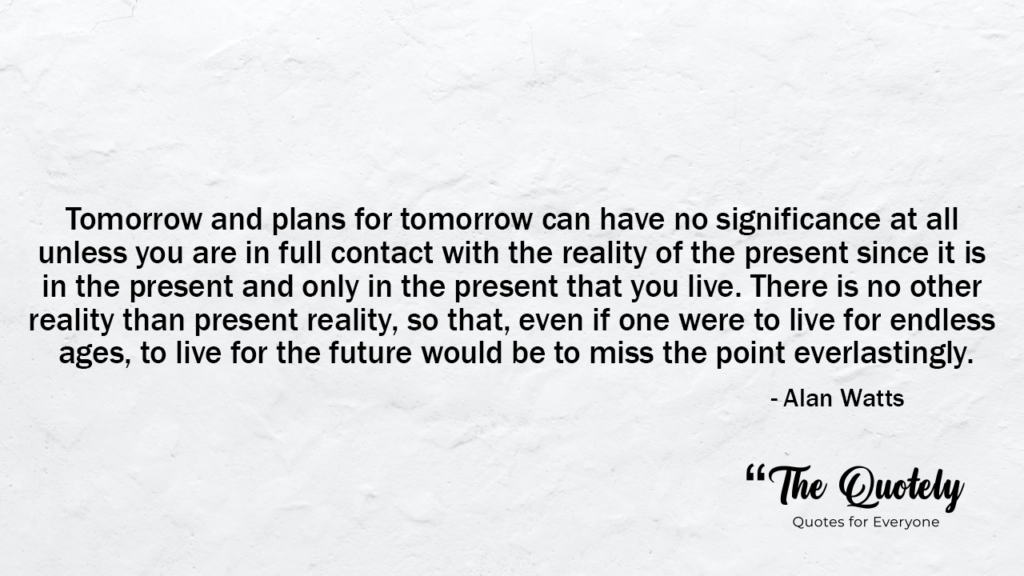
- “Tomorrow and plans for tomorrow can have no significance at all unless you are in full contact with the reality of the present since it is in the present and only in the present that you live. There is no other reality than present reality, so that, even if one were to live for endless ages, to live for the future would be to miss the point everlastingly.”
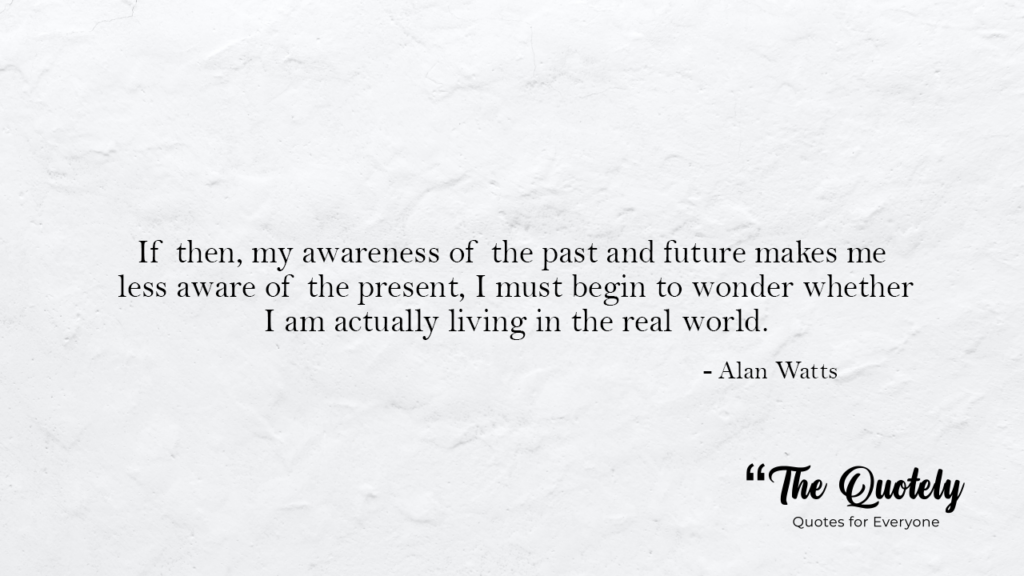
- “If then, my awareness of the past and future makes me less aware of the present, I must begin to wonder whether I am actually living in the real world.”
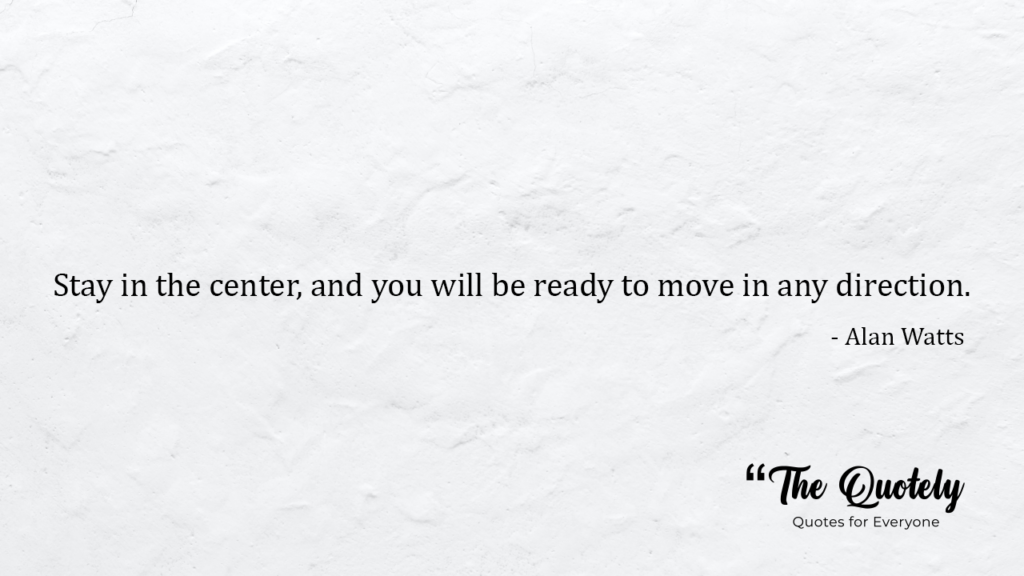
- “Stay in the center, and you will be ready to move in any direction.”
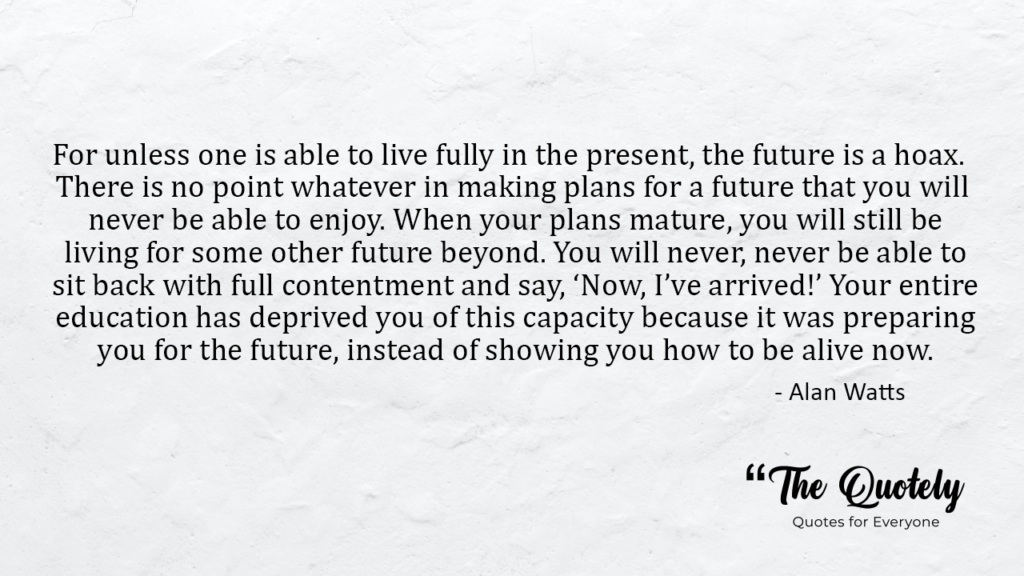
- “For unless one is able to live fully in the present, the future is a hoax. There is no point whatever in making plans for a future that you will never be able to enjoy. When your plans mature, you will still be living for some other future beyond. You will never, never be able to sit back with full contentment and say, ‘Now, I’ve arrived!’ Your entire education has deprived you of this capacity because it was preparing you for the future, instead of showing you how to be alive now.”
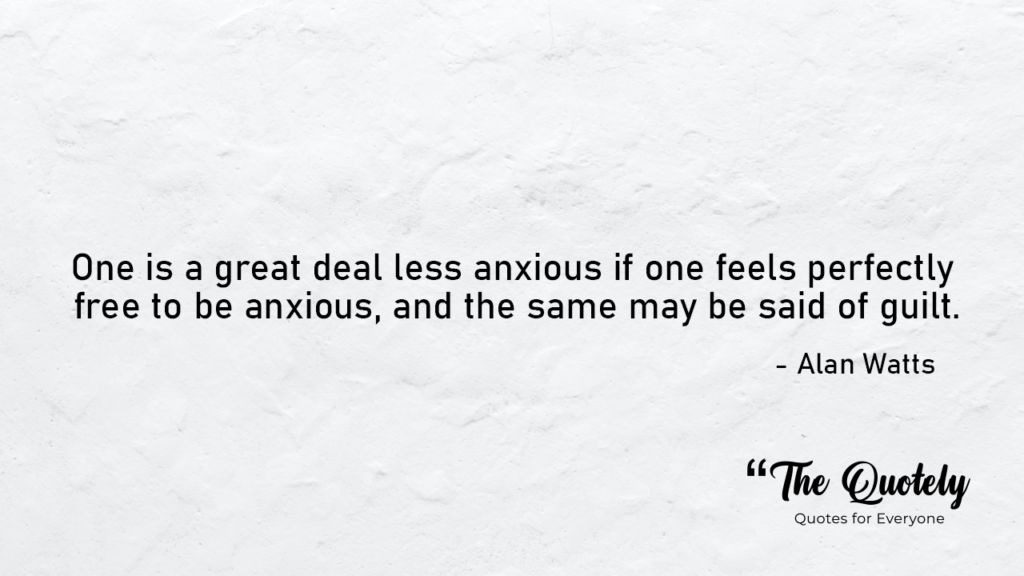
- “One is a great deal less anxious if one feels perfectly free to be anxious, and the same may be said of guilt.”
You may like: Country girl quotes, Bitch quotes
On the meaning of life
Enjoying the moment and being fully aware of what you are experiencing is known as mindfulness. Mindfulness is exactly how it sounds, to pay attention to your thoughts, emotions, and surroundings without judgment.
Enjoyment of living from the moment you are in will leave a lasting impression on your life. As well as making that moment special for the person sharing it with you.
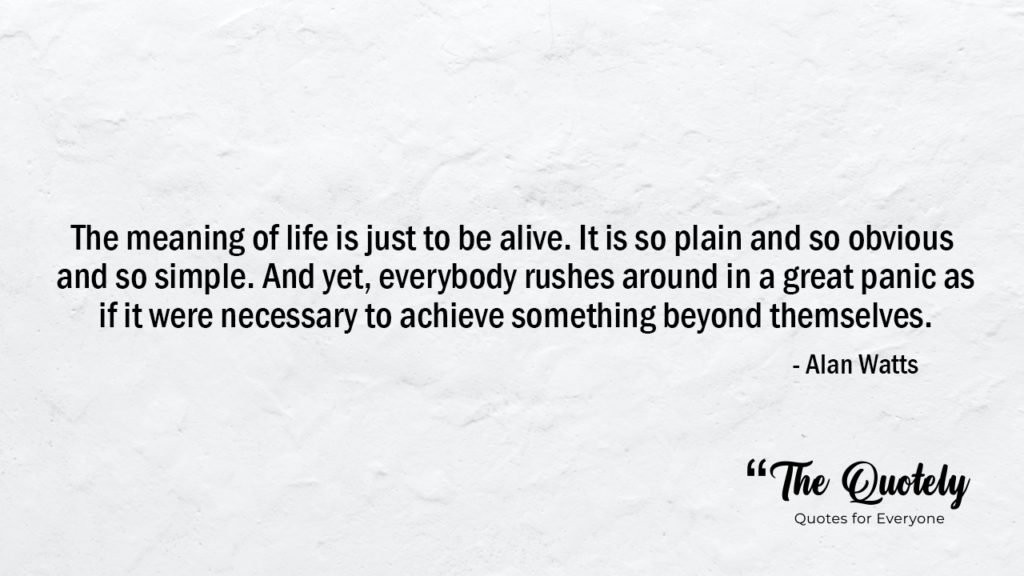
- “The meaning of life is just to be alive. It is so plain and so obvious and so simple. And yet, everybody rushes around in a great panic as if it were necessary to achieve something beyond themselves.”
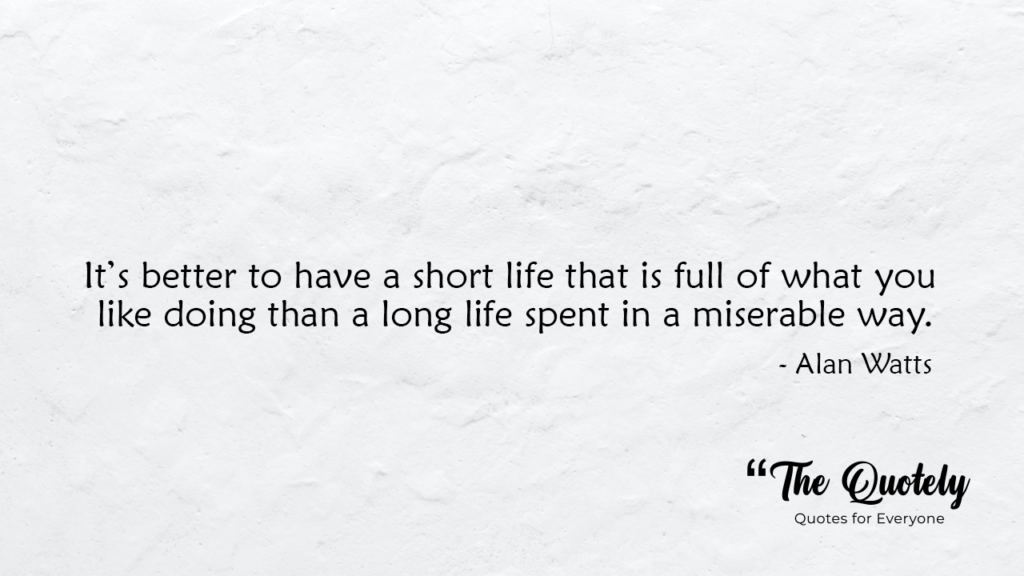
- “It’s better to have a short life that is full of what you like doing than a long life spent in a miserable way.”
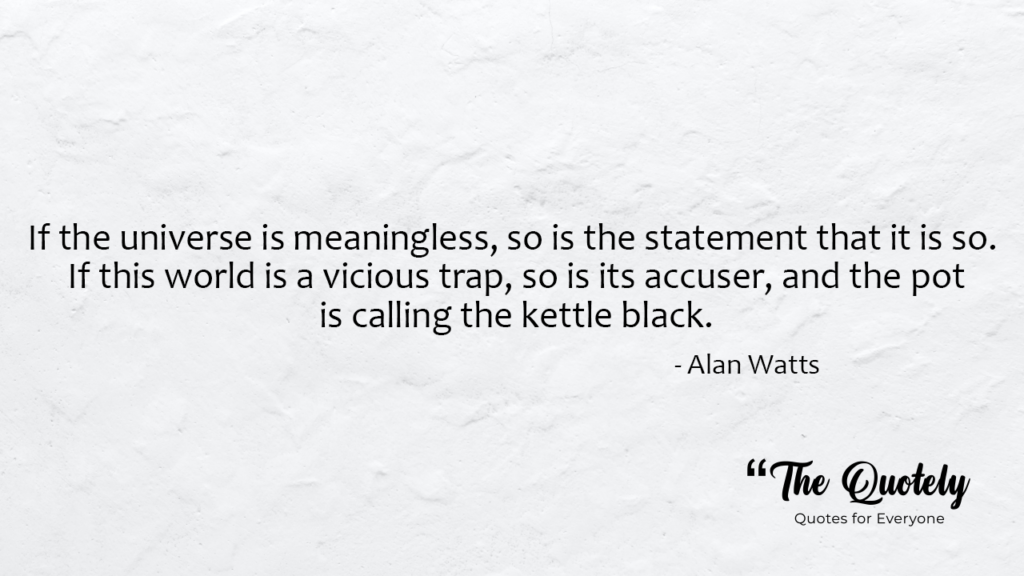
- “If the universe is meaningless, so is the statement that it is so. If this world is a vicious trap, so is its accuser, and the pot is calling the kettle black.”
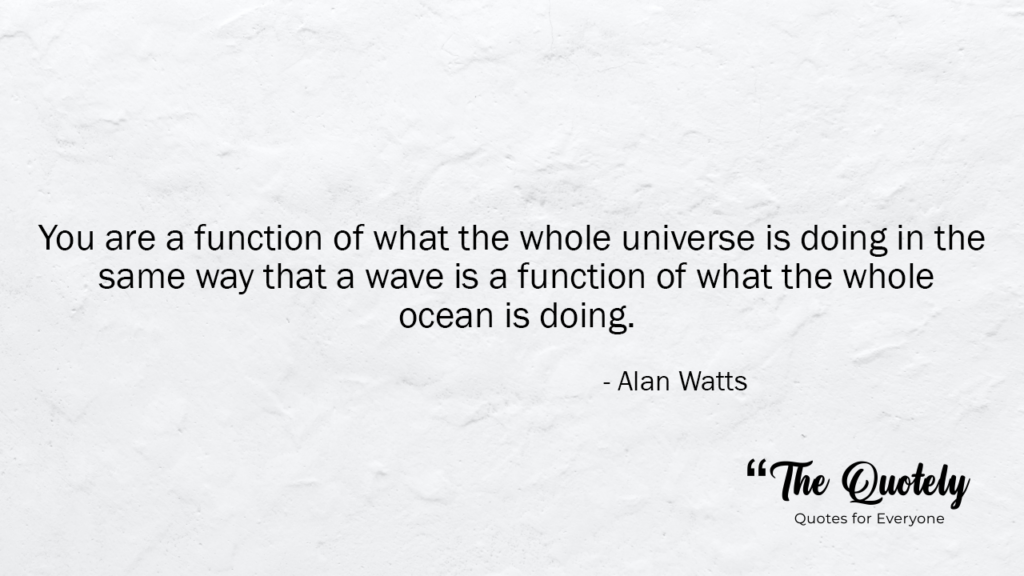
- “You are a function of what the whole universe is doing in the same way that a wave is a function of what the whole ocean is doing.”

- “If you say that getting the money is the most important thing, you’ll spend your life completely wasting your time. You’ll be doing things you don’t like doing in order to go on living, that is to go on doing things you don’t like doing, which is stupid.”
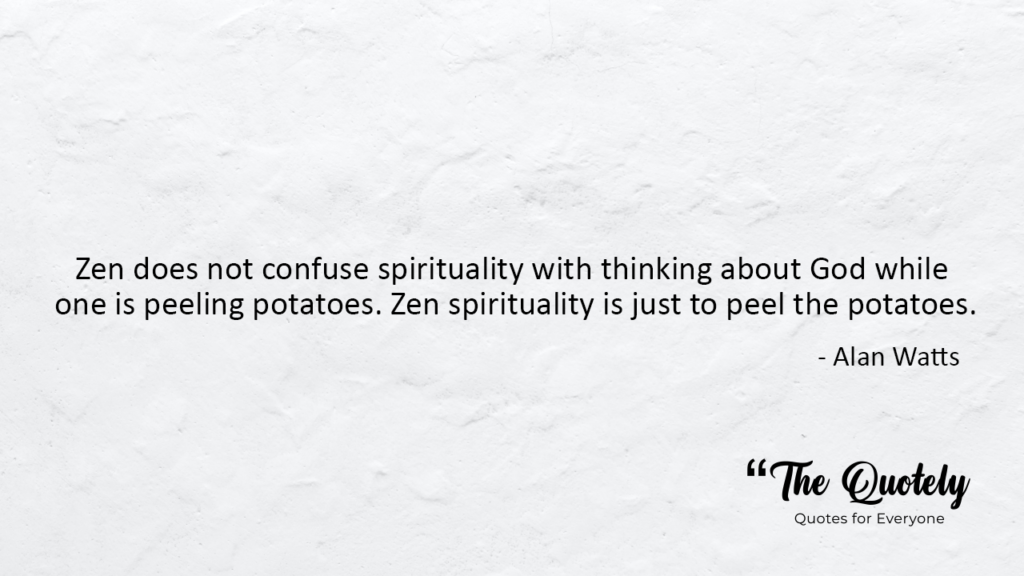
- “Zen does not confuse spirituality with thinking about God while one is peeling potatoes. Zen spirituality is just to peel the potatoes.”
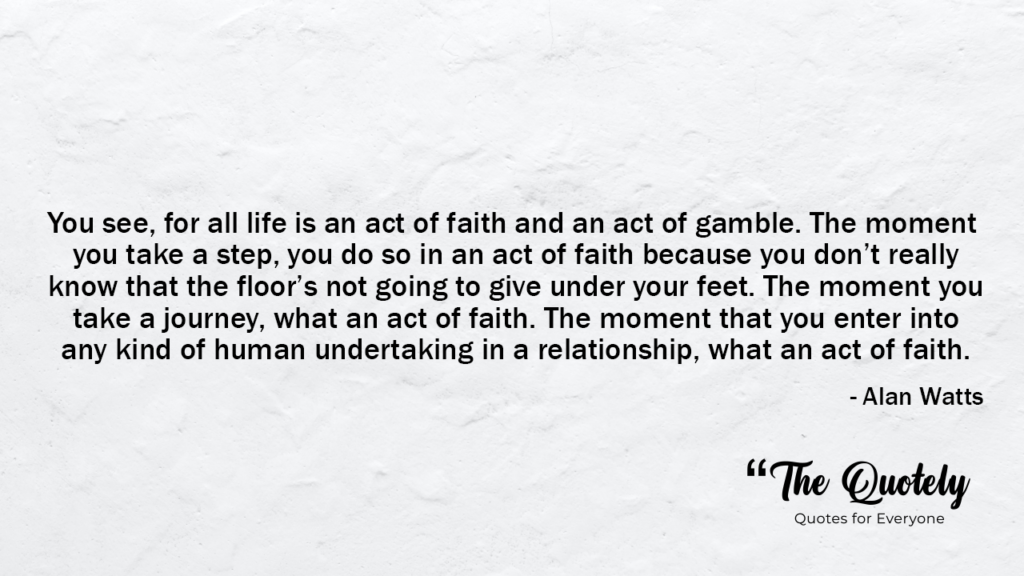
- “You see, for all life is an act of faith and an act of gamble. The moment you take a step, you do so in an act of faith because you don’t really know that the floor’s not going to give under your feet. The moment you take a journey, what an act of faith. The moment that you enter into any kind of human undertaking in a relationship, what an act of faith.”
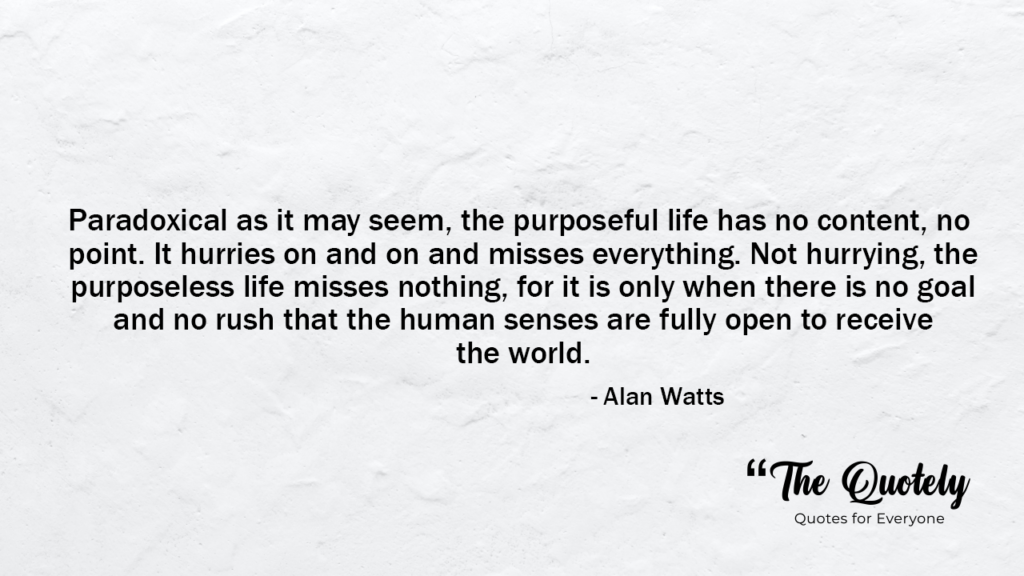
- “Paradoxical as it may seem, the purposeful life has no content, no point. It hurries on and on and misses everything. Not hurrying, the purposeless life misses nothing, for it is only when there is no goal and no rush that the human senses are fully open to receive the world.”
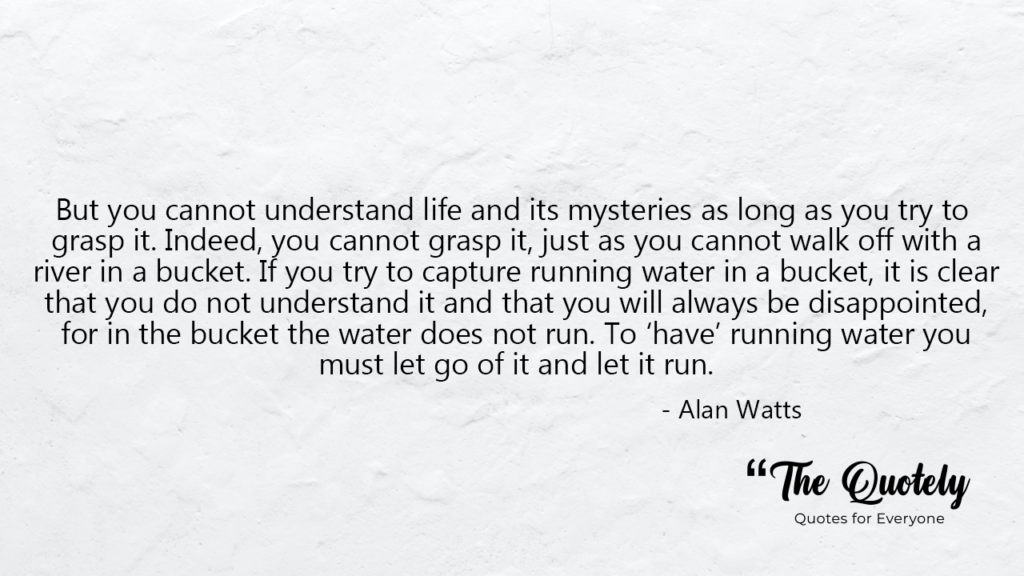
- “But you cannot understand life and its mysteries as long as you try to grasp it. Indeed, you cannot grasp it, just as you cannot walk off with a river in a bucket. If you try to capture running water in a bucket, it is clear that you do not understand it and that you will always be disappointed, for in the bucket the water does not run. To ‘have’ running water you must let go of it and let it run.”
On the mind
These Alan Watts Quotes will tell you that we have created a problem for ourselves by confusing the intelligible with the fixed. To be meaningful, life must be understandable in terms of fixed ideas and laws, and these in turn must correspond to unchanging and eternal realities behind the shifting scene.
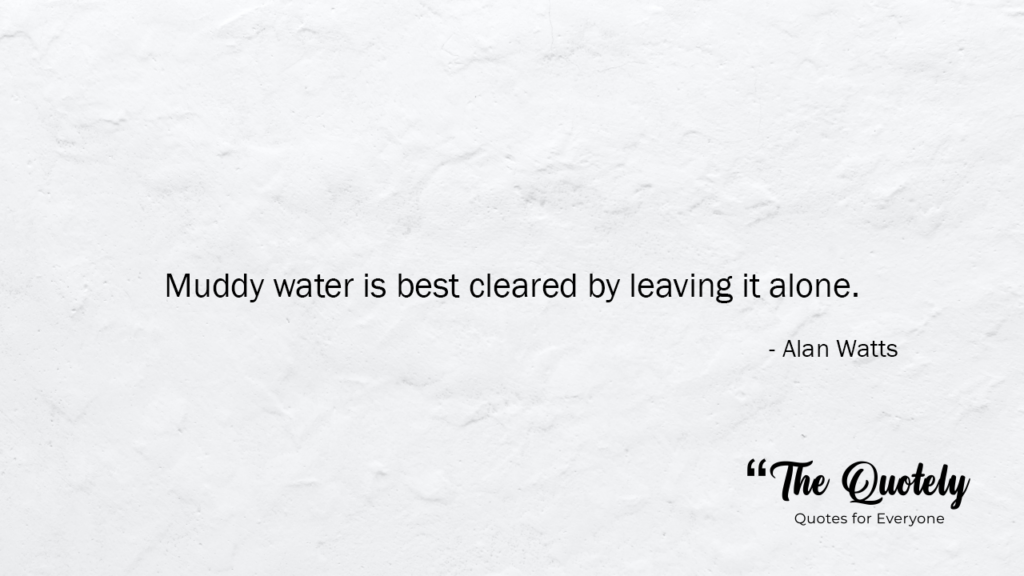
- “Muddy water is best cleared by leaving it alone.”
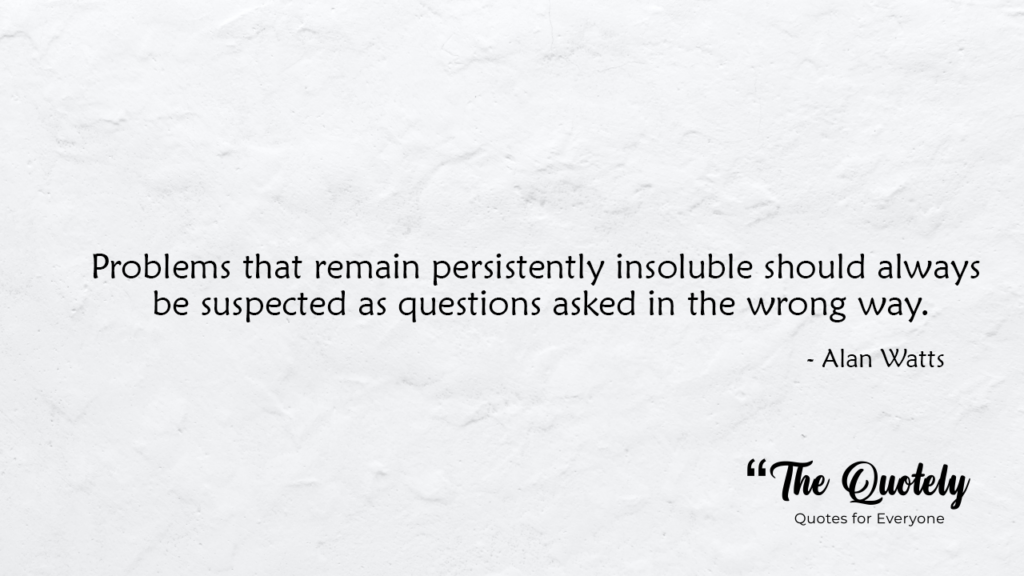
- “Problems that remain persistently insoluble should always be suspected as questions asked in the wrong way.”
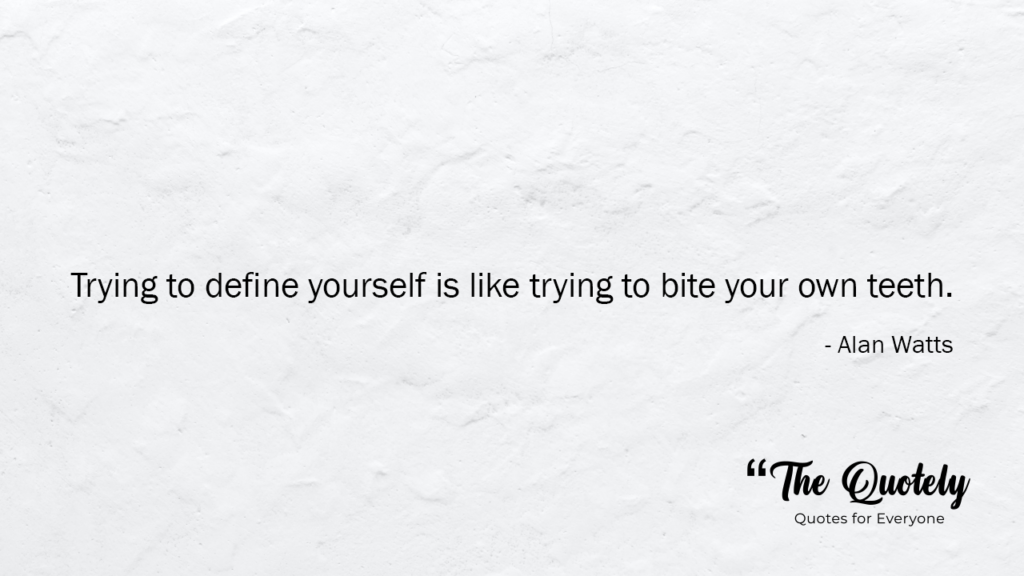
- “Trying to define yourself is like trying to bite your own teeth.”
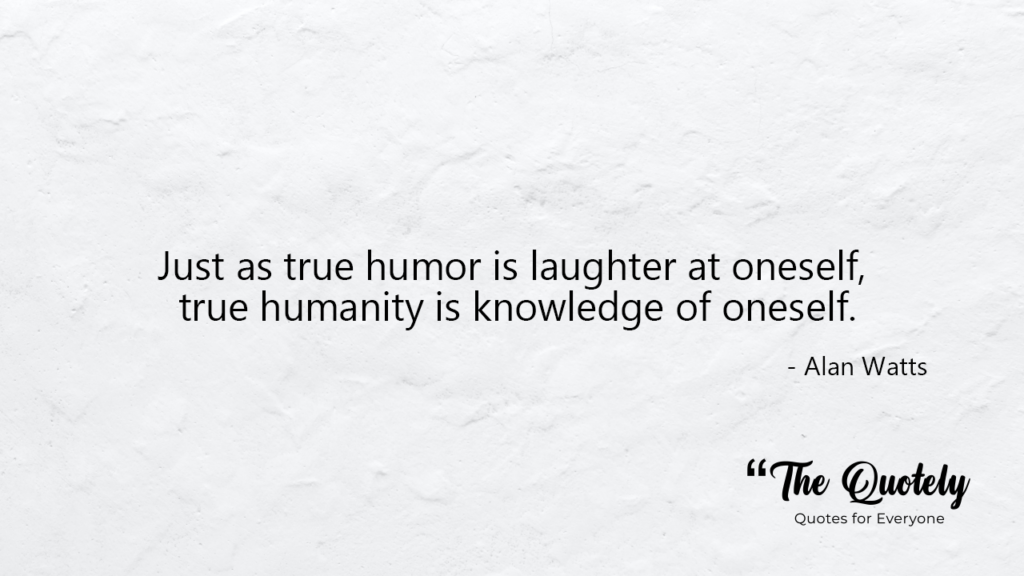
- “Just as true humor is laughter at oneself, true humanity is knowledge of oneself.”
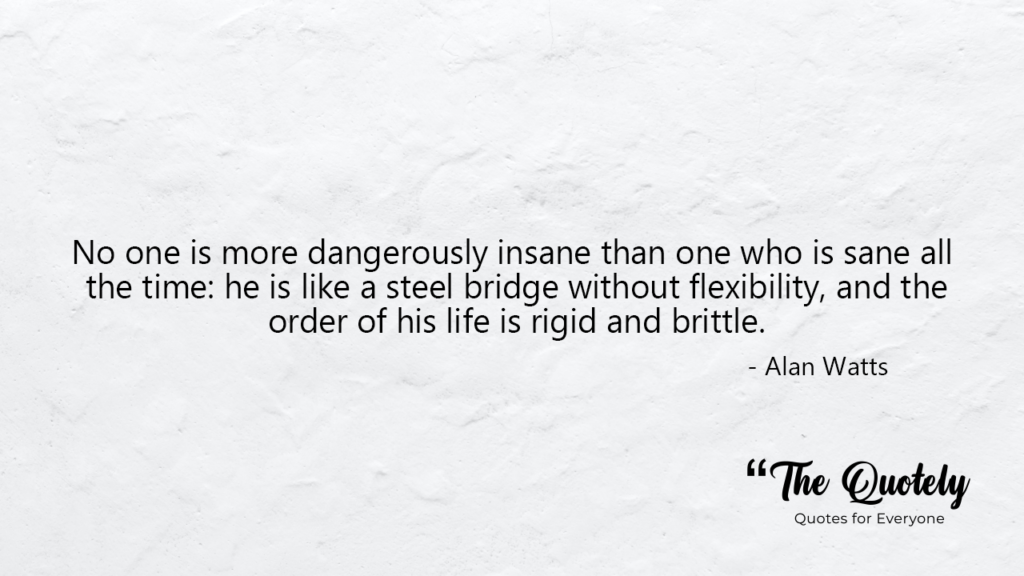
- “No one is more dangerously insane than one who is sane all the time: he is like a steel bridge without flexibility, and the order of his life is rigid and brittle.”
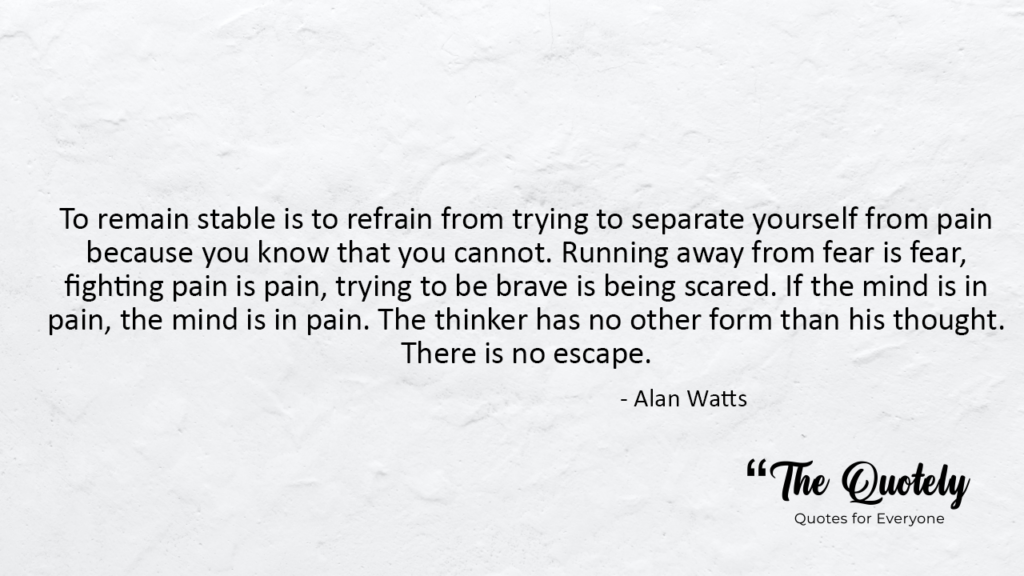
- “To remain stable is to refrain from trying to separate yourself from pain because you know that you cannot. Running away from fear is fear, fighting pain is pain, trying to be brave is being scared. If the mind is in pain, the mind is in pain. The thinker has no other form than his thought. There is no escape.”
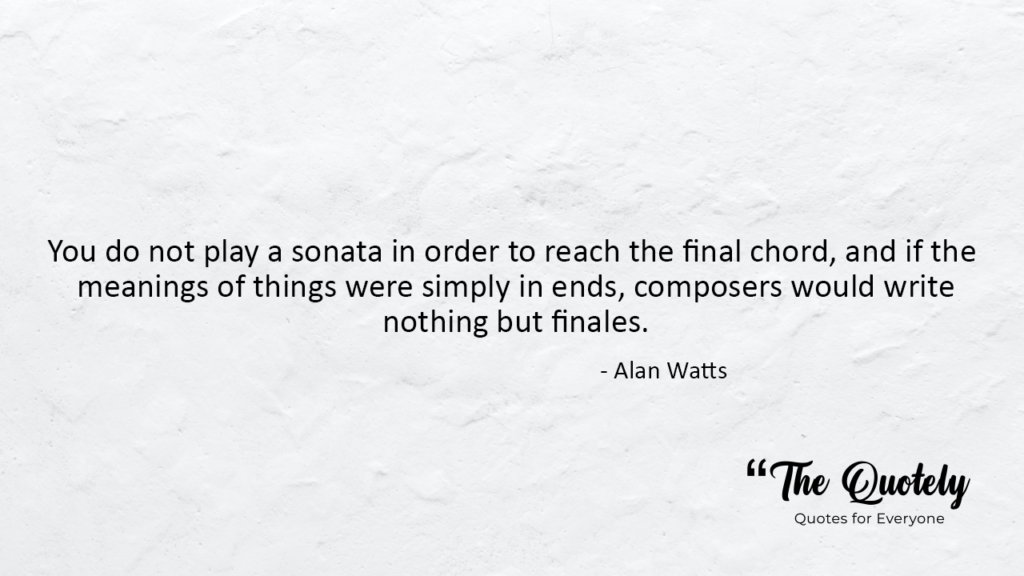
- “You do not play a sonata in order to reach the final chord, and if the meanings of things were simply in ends, composers would write nothing but finales.”
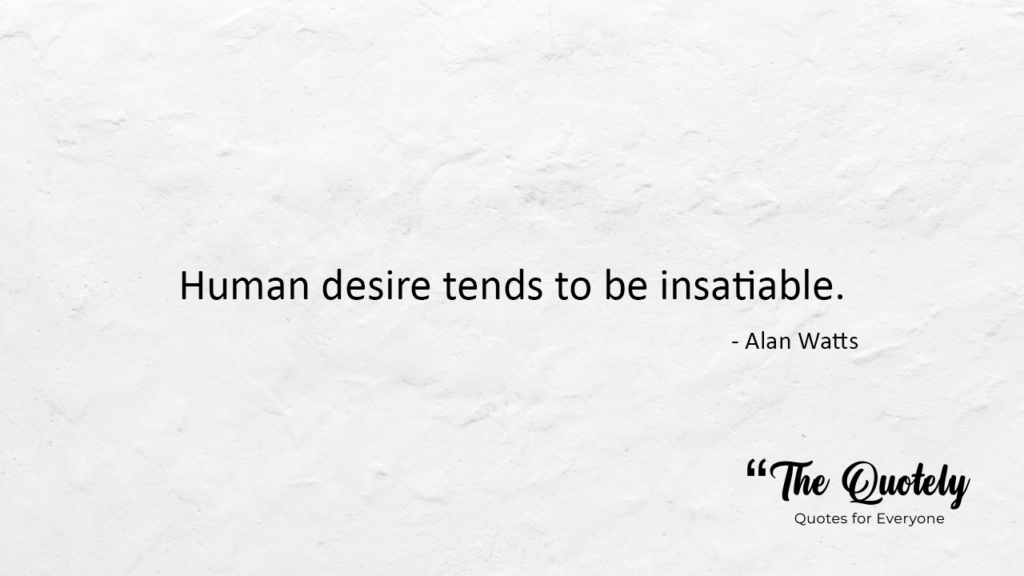
- “Human desire tends to be insatiable.”
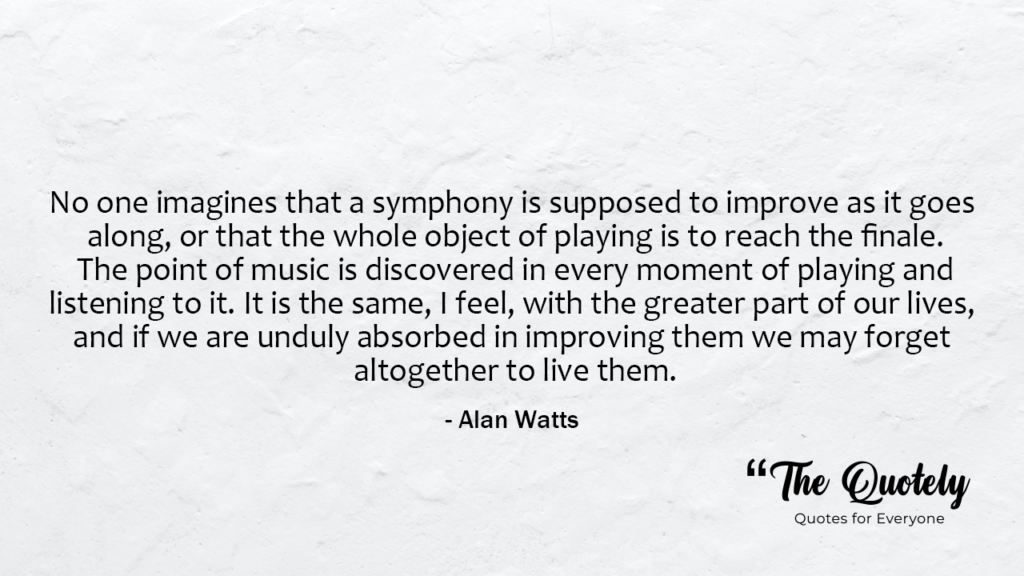
- “No one imagines that a symphony is supposed to improve as it goes along, or that the whole object of playing is to reach the finale. The point of music is discovered in every moment of playing and listening to it. It is the same, I feel, with the greater part of our lives, and if we are unduly absorbed in improving them we may forget altogether to live them.”
On letting go
Letting go is something that we often associate with some sort of a departure. We think of letting go as being complete in one way or another. We think that in order to leave what was behind, we will have to be finished with it and move away from it.
Yet this is not true! Letting go is actually an important part of living a happy and healthy life! Alan Watts Quotes about letting go will surely change your way of thinking.
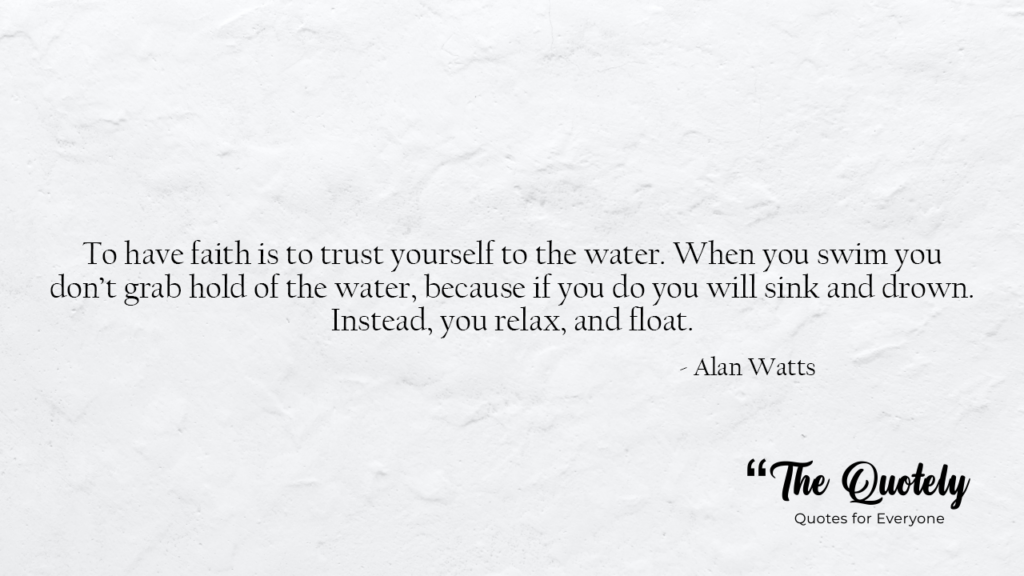
- “To have faith is to trust yourself to the water. When you swim you don’t grab hold of the water, because if you do you will sink and drown. Instead, you relax, and float.”
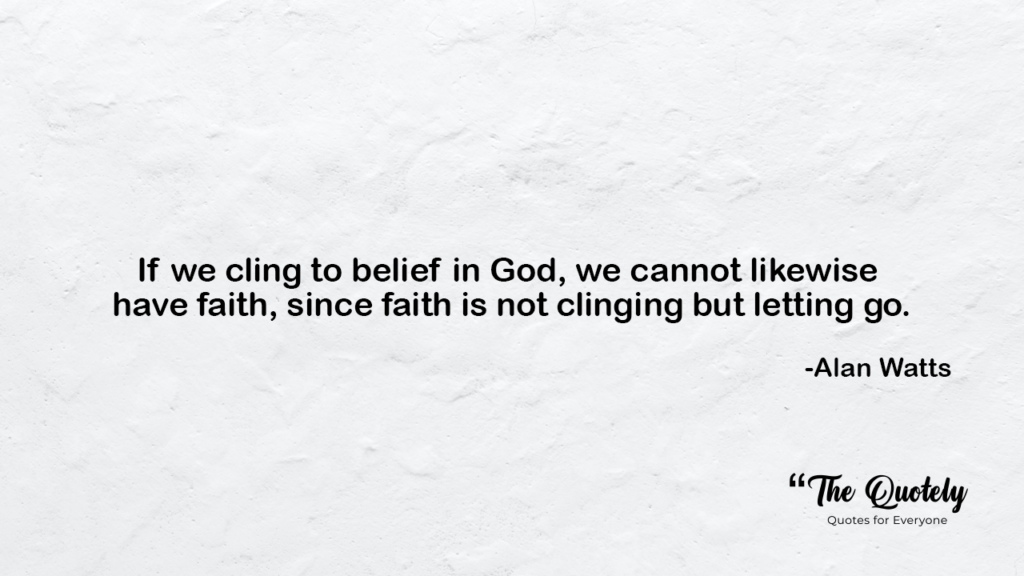
- “If we cling to belief in God, we cannot likewise have faith, since faith is not clinging but letting go.”
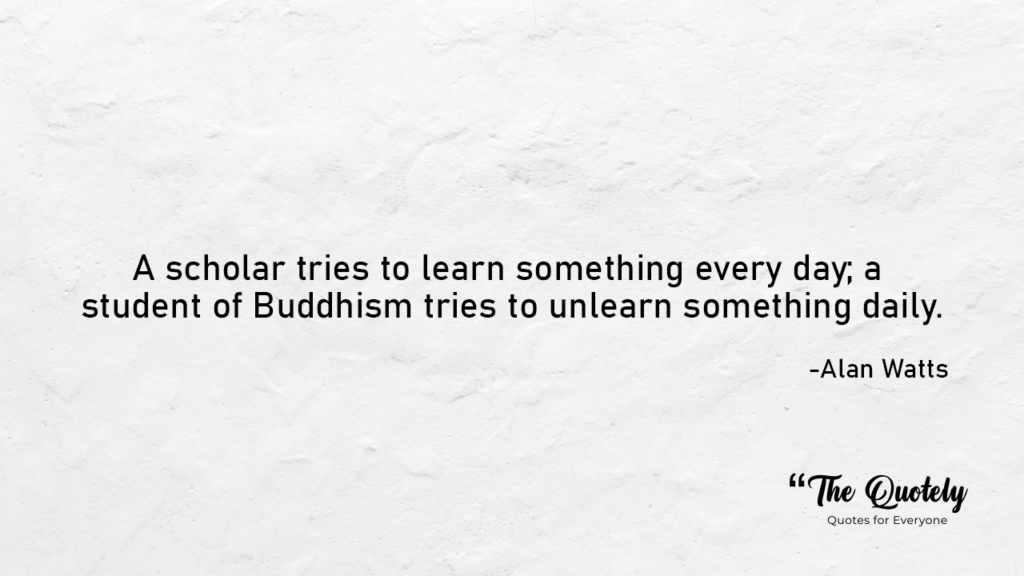
- “A scholar tries to learn something every day; a student of Buddhism tries to unlearn something daily.”
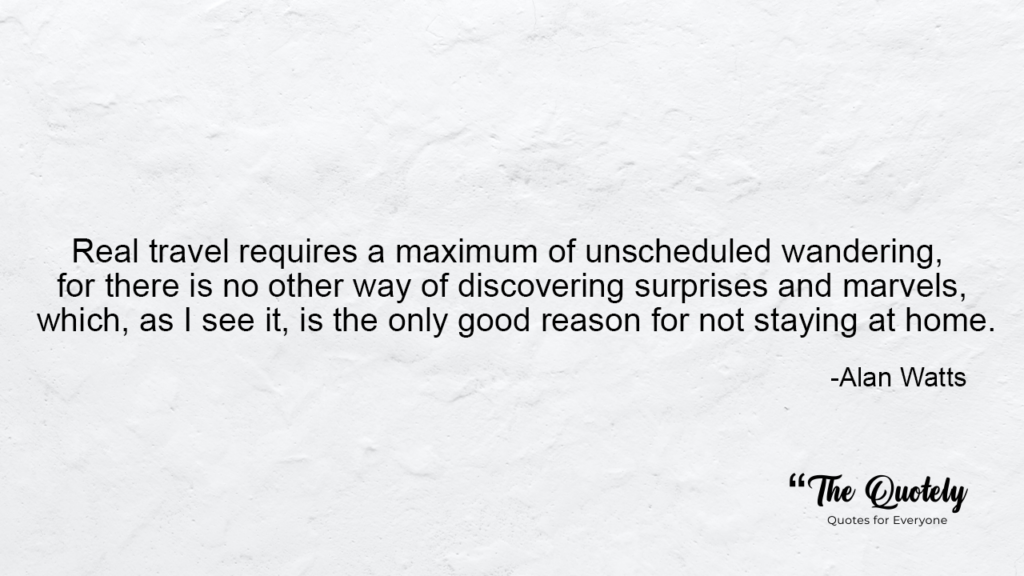
- “Real travel requires a maximum of unscheduled wandering, for there is no other way of discovering surprises and marvels, which, as I see it, is the only good reason for not staying at home.”
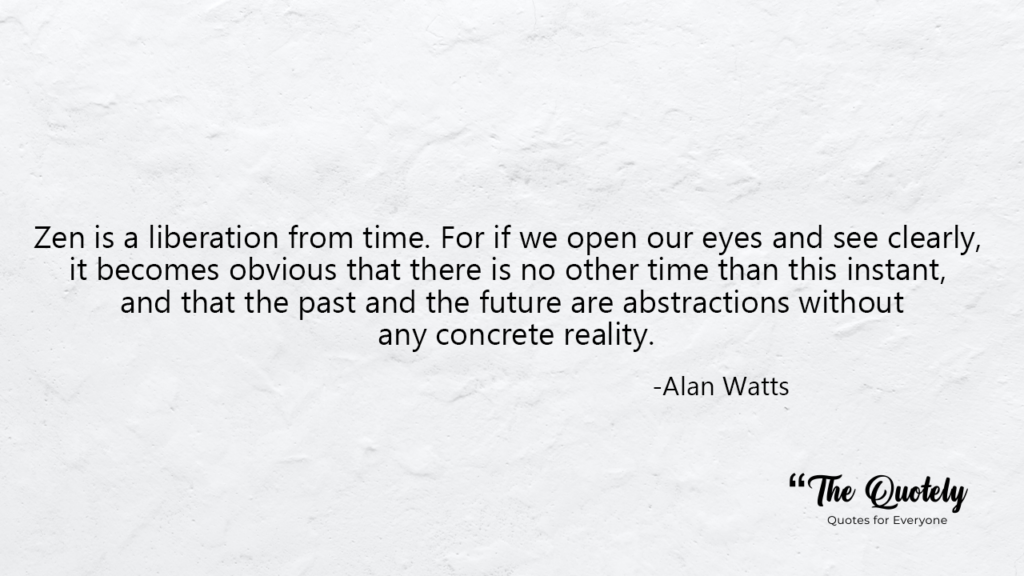
- “Zen is a liberation from time. For if we open our eyes and see clearly, it becomes obvious that there is no other time than this instant, and that the past and the future are abstractions without any concrete reality.”
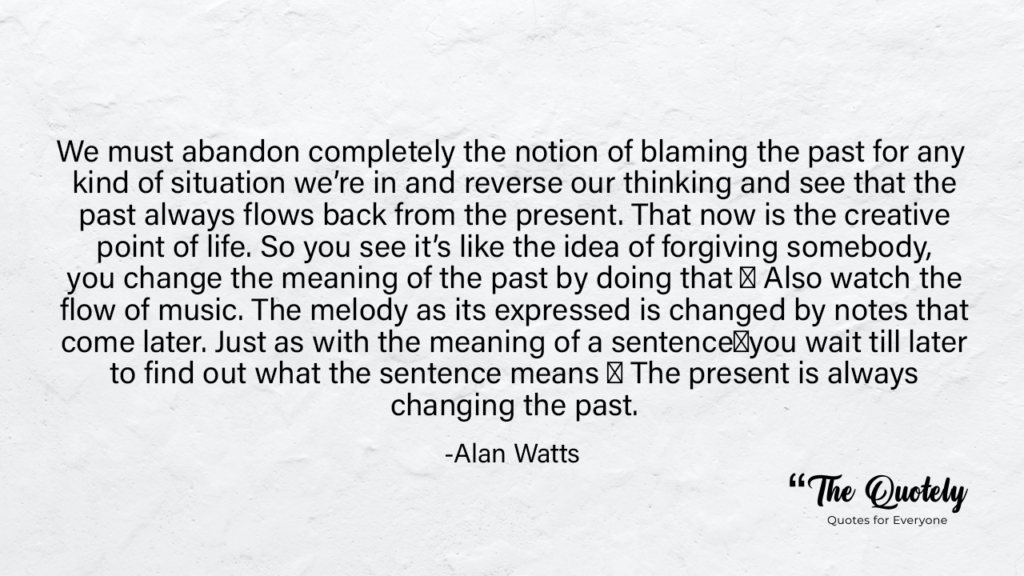
- “We must abandon completely the notion of blaming the past for any kind of situation we’re in and reverse our thinking and see that the past always flows back from the present. That now is the creative point of life. So you see it’s like the idea of forgiving somebody, you change the meaning of the past by doing that … Also watch the flow of music. The melody as its expressed is changed by notes that come later. Just as with the meaning of a sentence…you wait till later to find out what the sentence means … The present is always changing the past.”
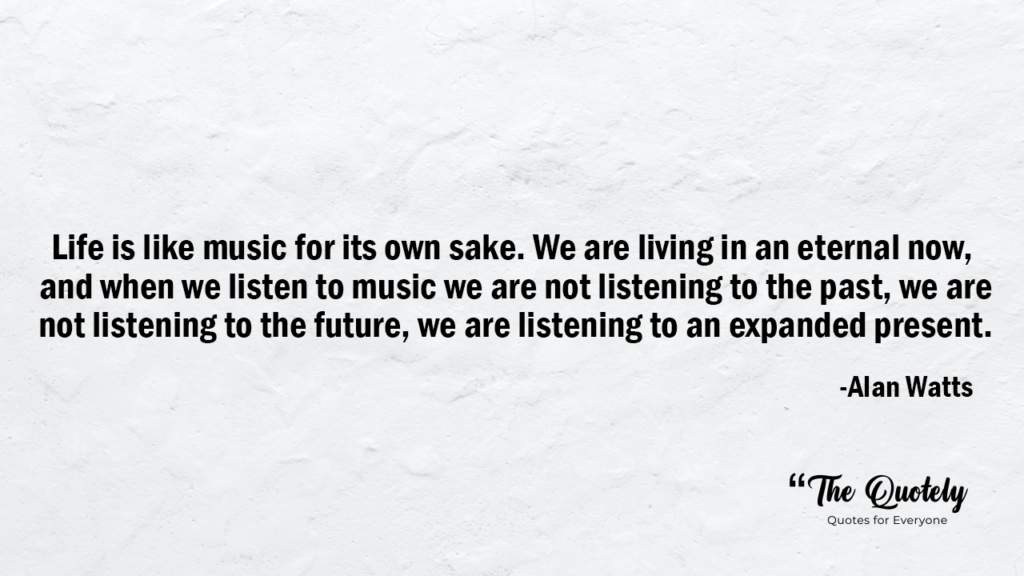
- “Life is like music for its own sake. We are living in an eternal now, and when we listen to music we are not listening to the past, we are not listening to the future, we are listening to an expanded present.”
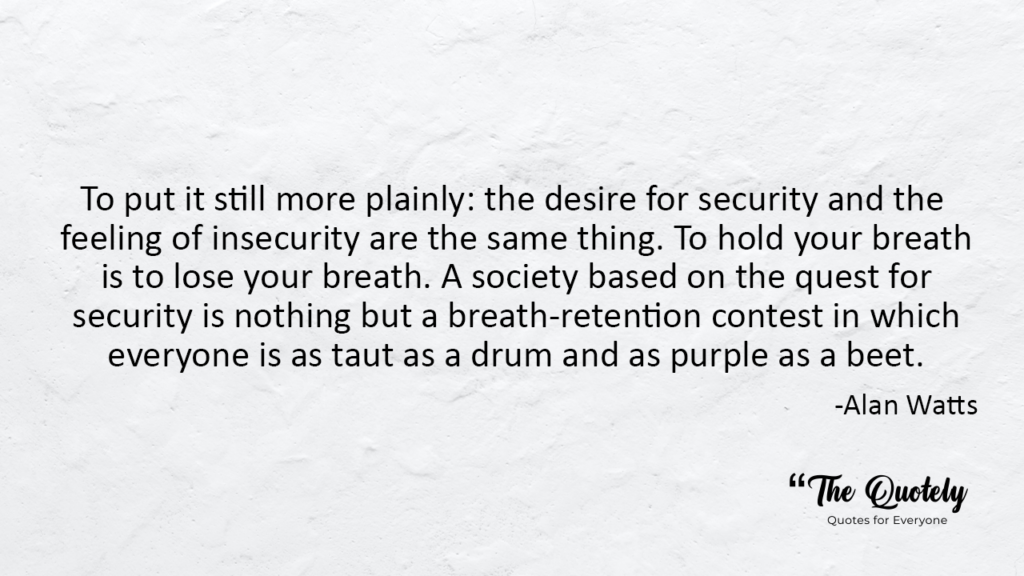
- “To put it still more plainly: the desire for security and the feeling of insecurity are the same thing. To hold your breath is to lose your breath. A society based on the quest for security is nothing but a breath-retention contest in which everyone is as taut as a drum and as purple as a beet.”
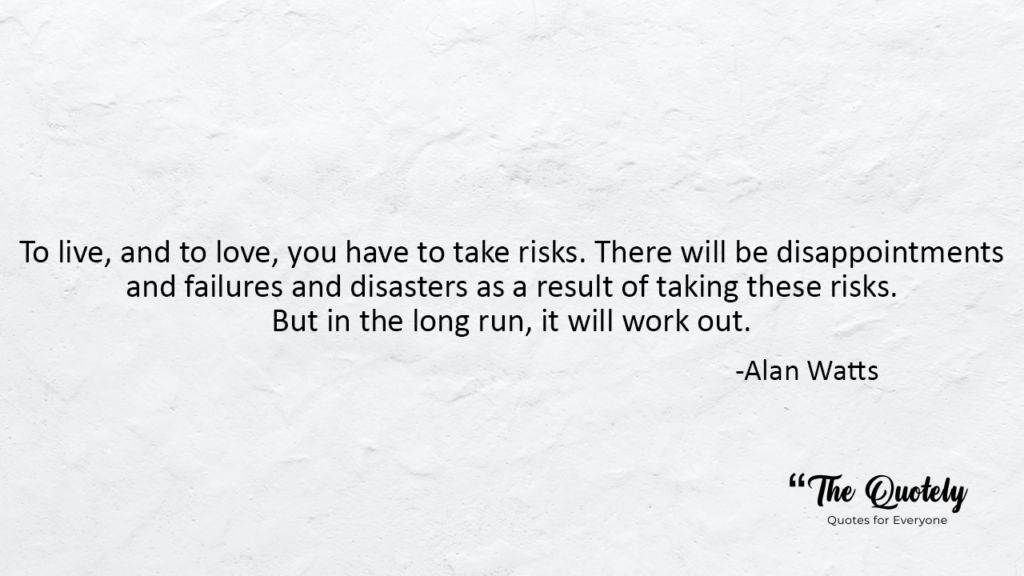
- “To live, and to love, you have to take risks. There will be disappointments and failures and disasters as a result of taking these risks. But in the long run, it will work out.”
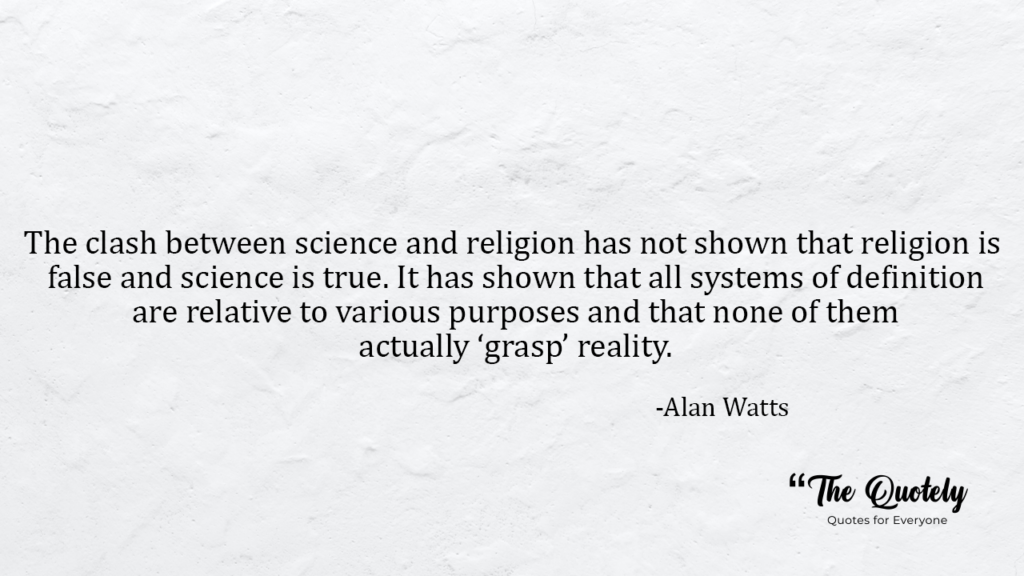
- “The clash between science and religion has not shown that religion is false and science is true. It has shown that all systems of definition are relative to various purposes and that none of them actually ‘grasp’ reality.
On change
According to Alan Watt, change is inevitable. Shifting paradigms in society, science and technology are creating a new environment where change is the name of the game. Businesses adapt because they know that to survive they have to follow trends and capitalize on changes in the economy. Below are some of the best quotes on change.
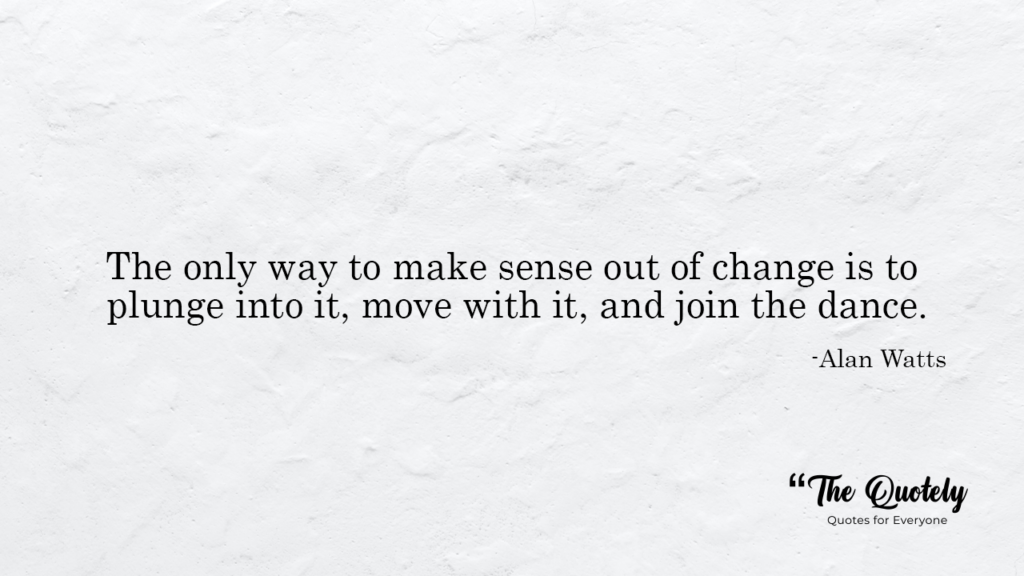
- “The only way to make sense out of change is to plunge into it, move with it, and join the dance.”
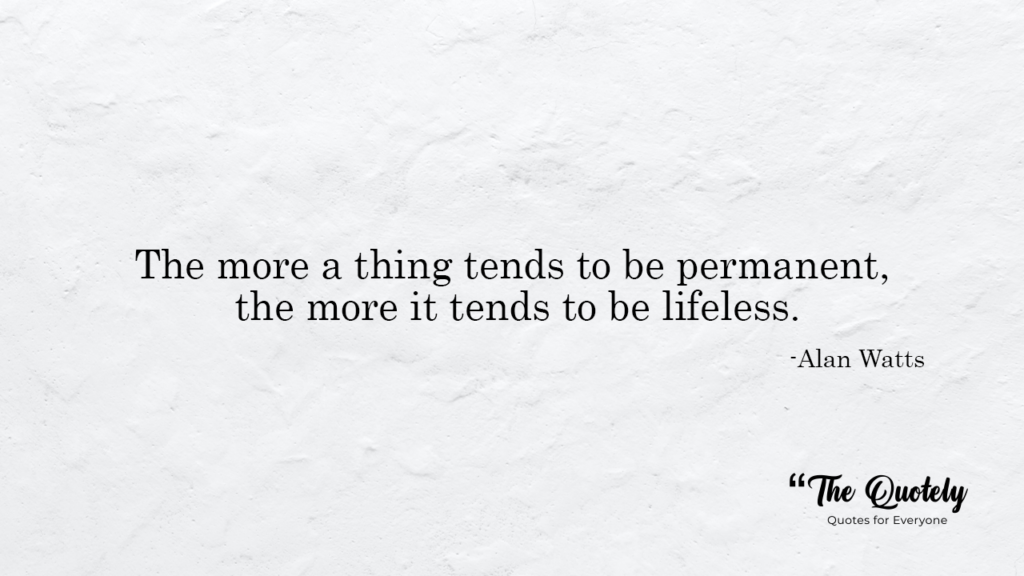
- “The more a thing tends to be permanent, the more it tends to be lifeless.”
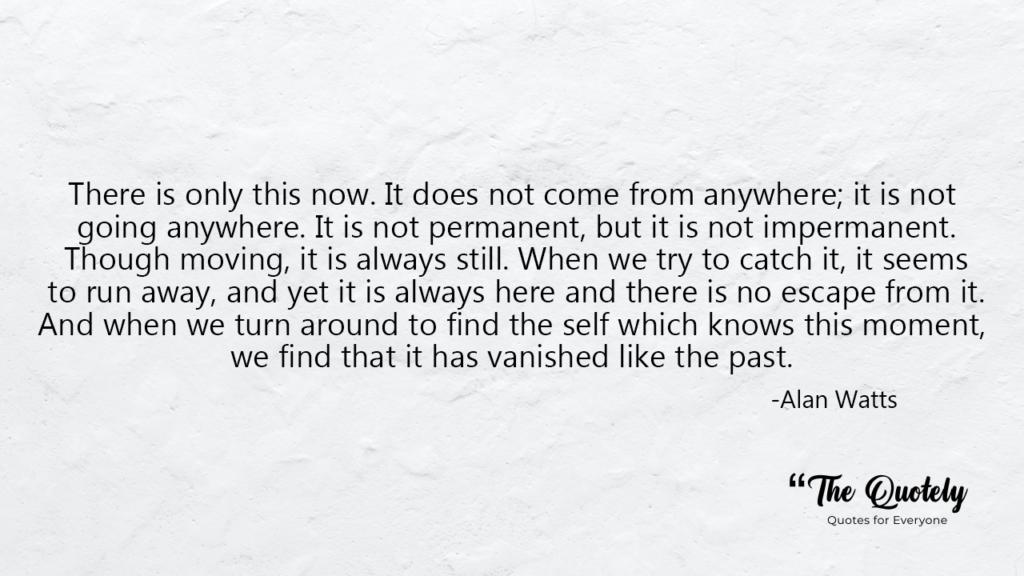
- “There is only this now. It does not come from anywhere; it is not going anywhere. It is not permanent, but it is not impermanent. Though moving, it is always still. When we try to catch it, it seems to run away, and yet it is always here and there is no escape from it. And when we turn around to find the self which knows this moment, we find that it has vanished like the past.”
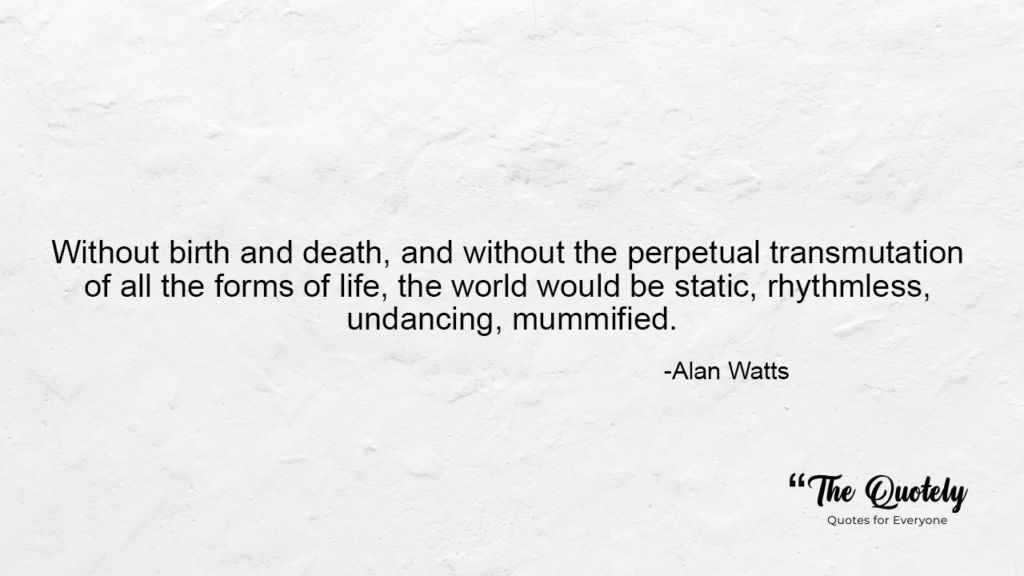
- “Without birth and death, and without the perpetual transmutation of all the forms of life, the world would be static, rhythmless, undancing, mummified.”
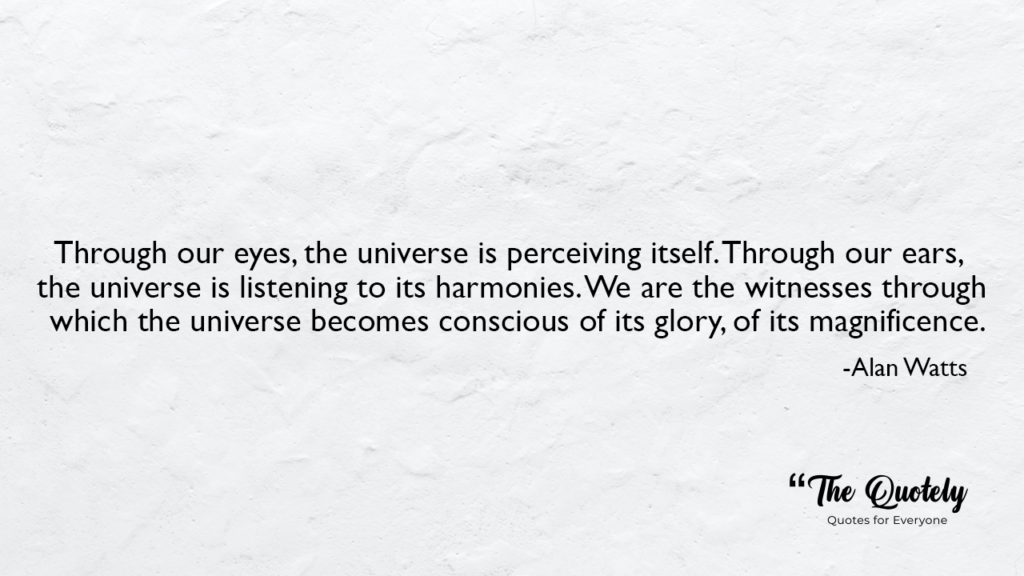
- “Through our eyes, the universe is perceiving itself. Through our ears, the universe is listening to its harmonies. We are the witnesses through which the universe becomes conscious of its glory, of its magnificence.”
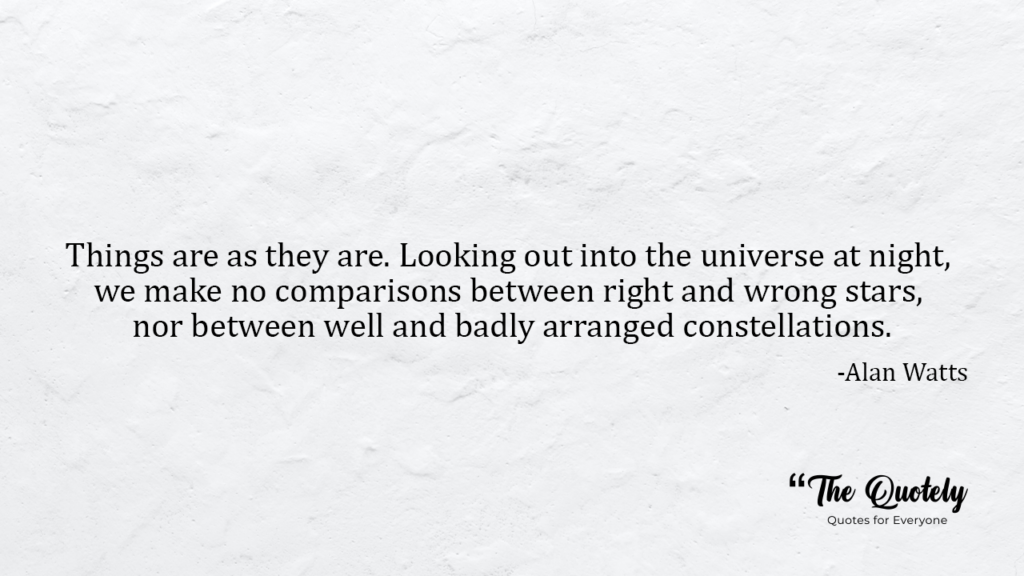
- “Things are as they are. Looking out into the universe at night, we make no comparisons between right and wrong stars, nor between well and badly arranged constellations.”

- “We do not ‘come into this world; we come out of it, as leaves from a tree. As the ocean “waves,” the universe ‘peoples.’ Every individual is an expression of the whole realm of nature, a unique action of the total universe.”
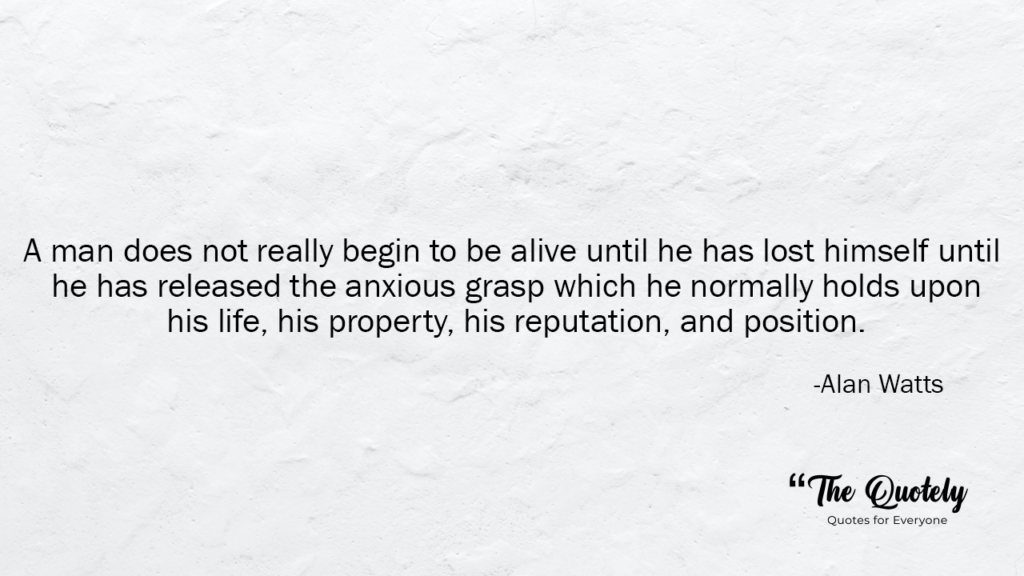
- “A man does not really begin to be alive until he has lost himself until he has released the anxious grasp which he normally holds upon his life, his property, his reputation, and position.”
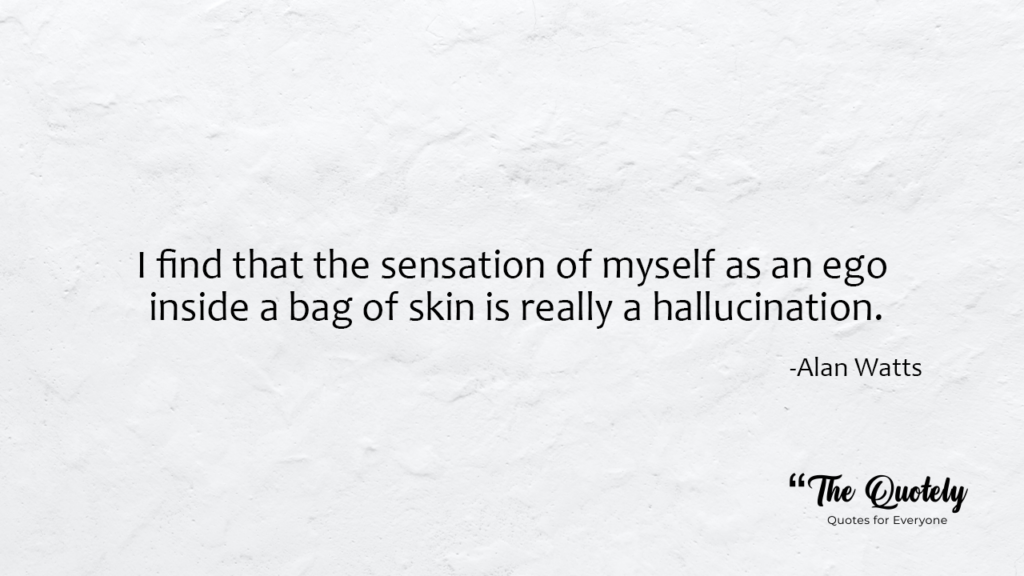
- “I find that the sensation of myself as an ego inside a bag of skin is really a hallucination.”
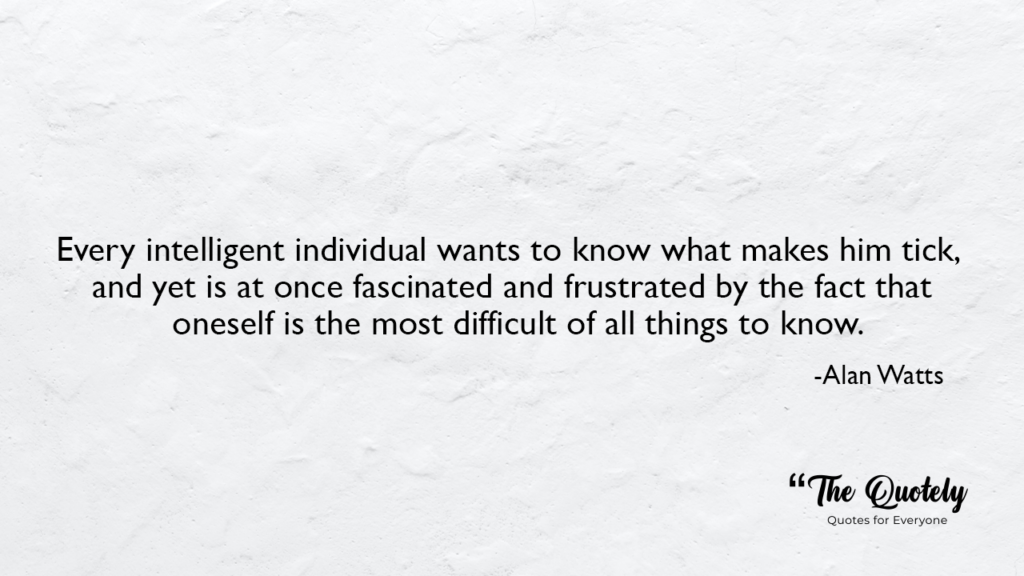
- “Every intelligent individual wants to know what makes him tick, and yet is at once fascinated and frustrated by the fact that oneself is the most difficult of all things to know.”
On death
While he is most well-known for his many published books on philosophy, Alan Watts spent almost his entire life teaching people how to unlearn everything they have learned throughout their lives in order to find personal meaning, purpose, and inner peace. He believed that death should be one of the most profound moments of our lives, or as he puts it “one of the great events of life”, so shouldn’t we celebrate each and every day as though it were our last?

- “Try to imagine what it will be like to go to sleep and never wake up… now try to imagine what it was like to wake up having never gone to sleep.”
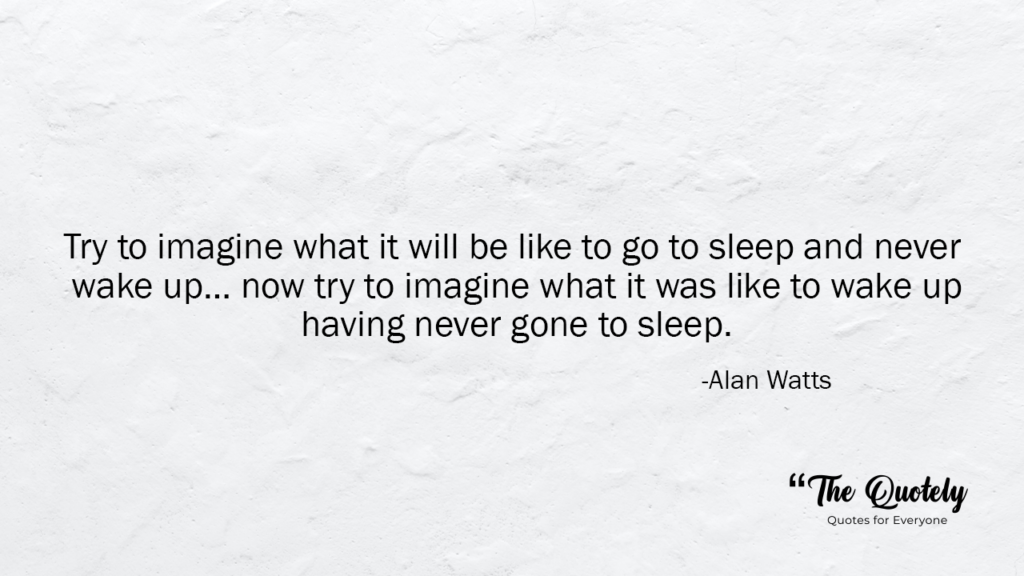
- “When you die, you don’t have to deal with everlasting nonexistence because that’s not an experience.”

- “th th, be afraid. The point is to get with it, to let it take over – fear, ghosts, pains, transience, dissolution, and all. And then comes the hitherto unbelievable surprise; you don’t die because you were never born. You had just forgotten who you are.”
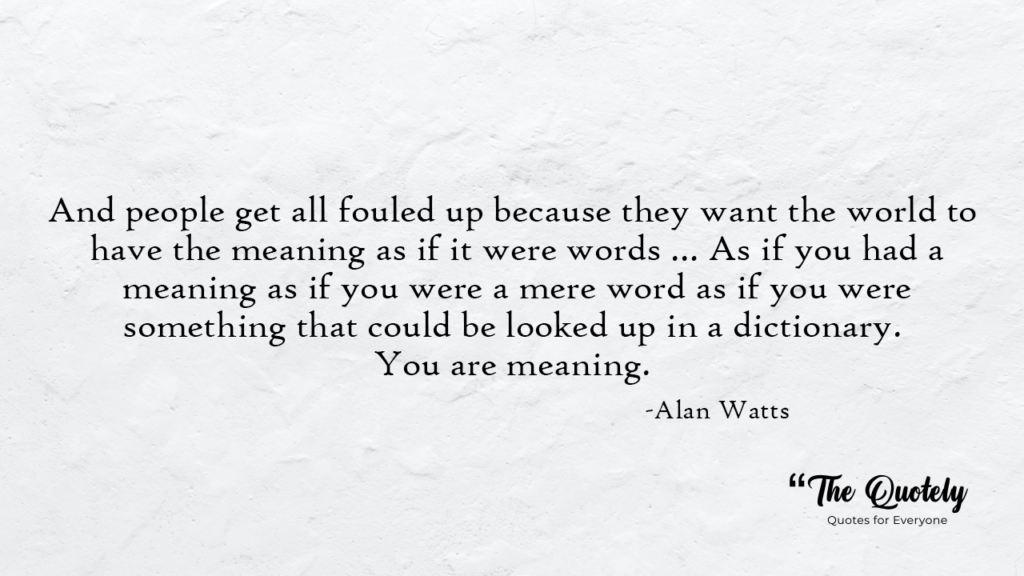
- “And people get all fouled up because they want the world to have the meaning as if it were words … As if you had a meaning as if you were a mere word as if you were something that could be looked up in a dictionary. You are meaning.”
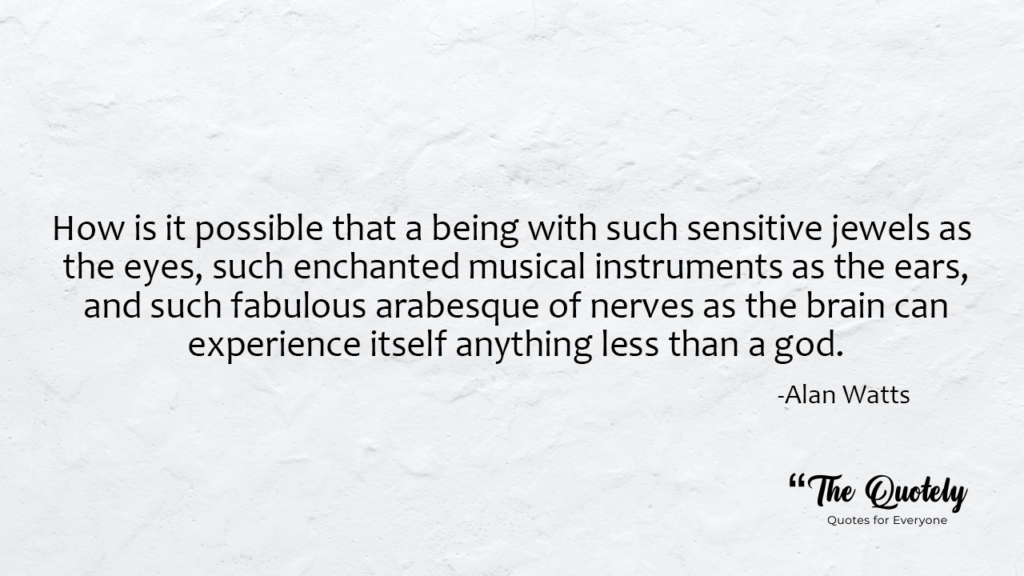
- “How is it possible that a being with such sensitive jewels as the eyes, such enchanted musical instruments as the ears, and such fabulous arabesque of nerves as the brain can experience itself anything less than a god.”
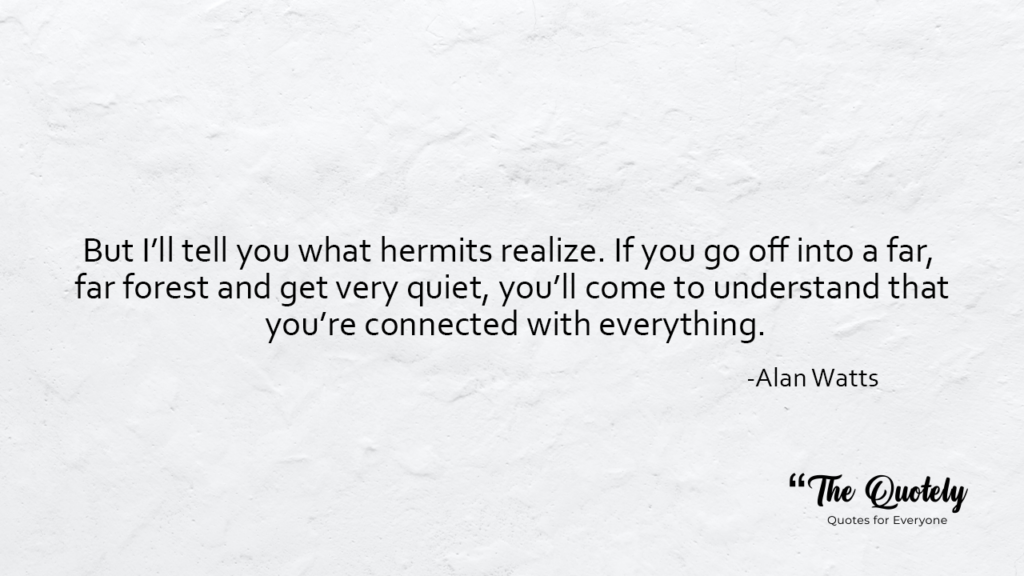
- “But I’ll tell you what hermits realize. If you go off into a far, far forest and get very quiet, you’ll come to understand that you’re connected with everything.”
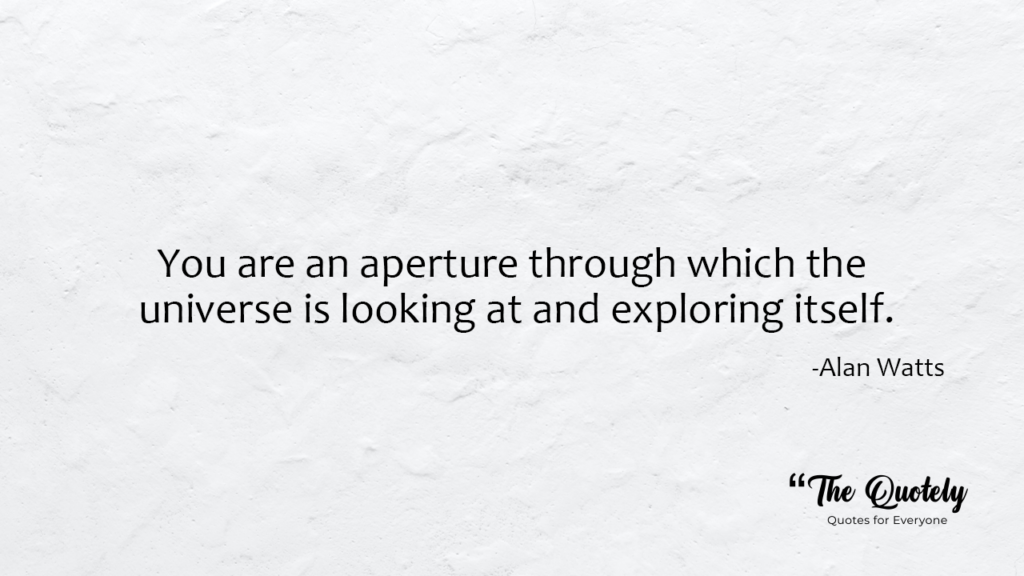
- “You are an aperture through which the universe is looking at and exploring itself.”
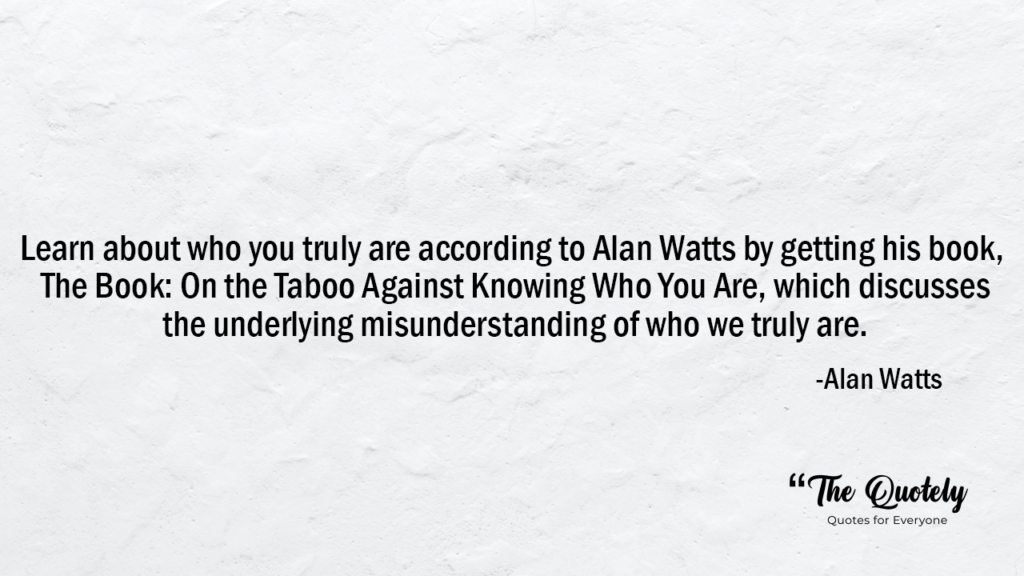
- Learn about who you truly are according to Alan Watts by getting his book, The Book: On the Taboo Against Knowing Who You Are, which discusses the underlying misunderstanding of who we truly are.
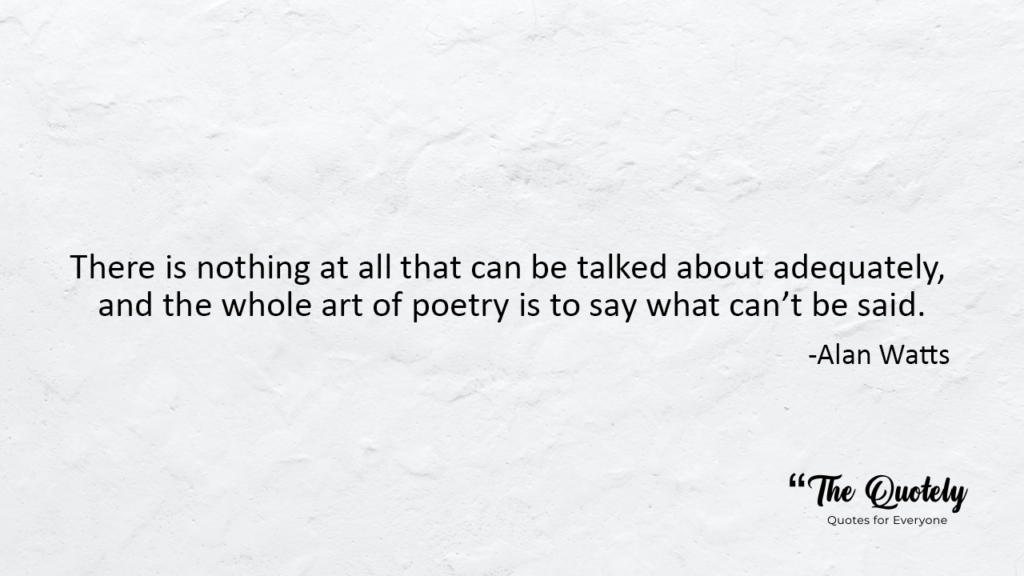
- “There is nothing at all that can be talked about adequately, and the whole art of poetry is to say what can’t be said.”
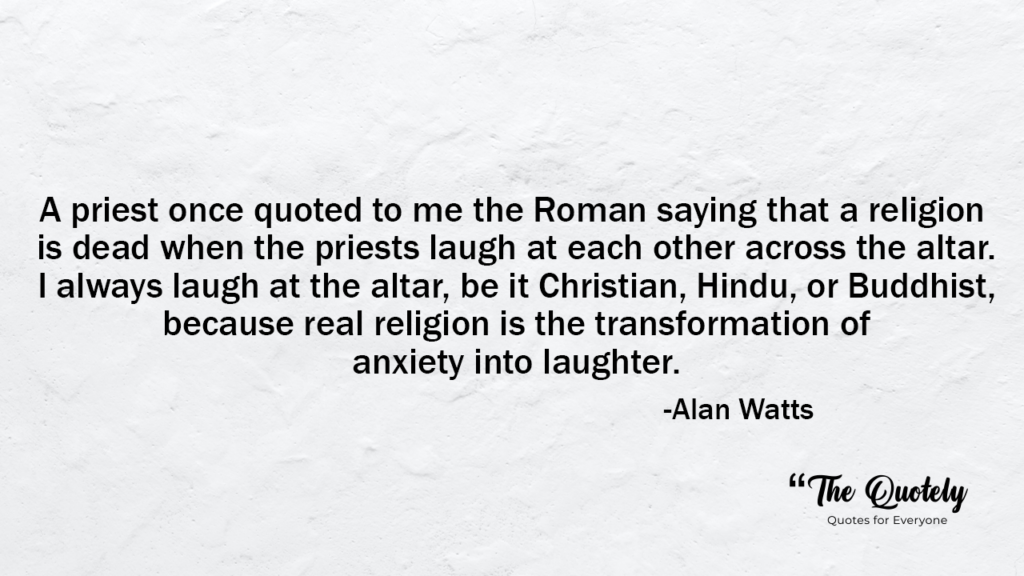
- “A priest once quoted to me the Roman saying that a religion is dead when the priests laugh at each other across the altar. I always laugh at the altar, be it Christian, Hindu, or Buddhist, because real religion is the transformation of anxiety into laughter.”
On religion
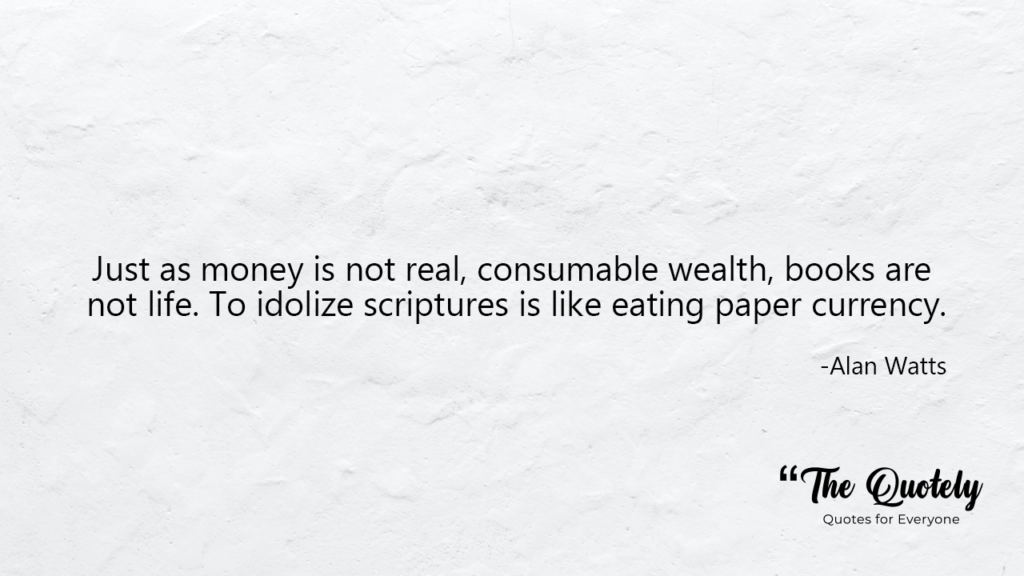
- “Just as money is not real, consumable wealth, books are not life. To idolize scriptures is like eating paper currency.”
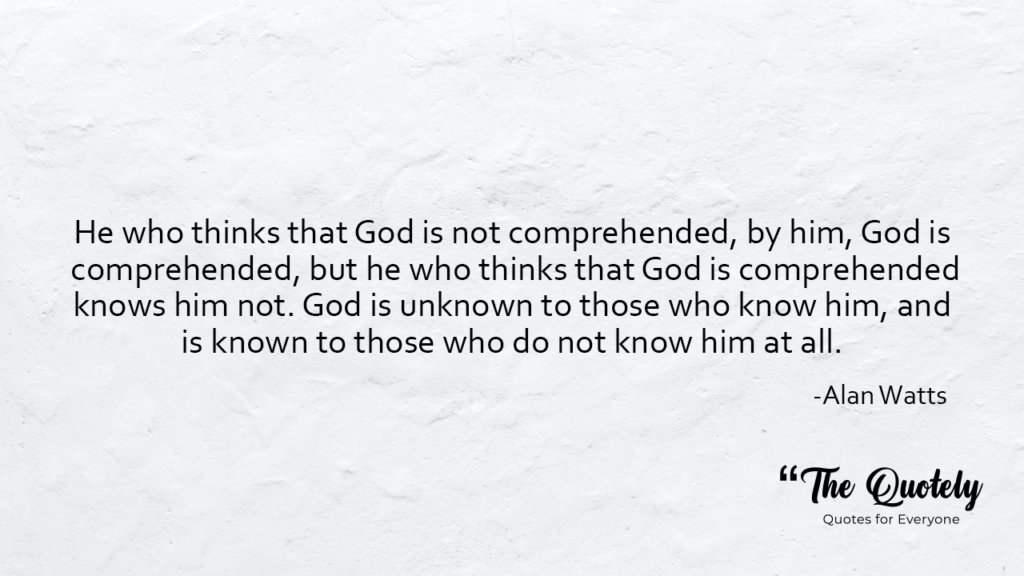
- “He who thinks that God is not comprehended, by him, God is comprehended, but he who thinks that God is comprehended knows him not. God is unknown to those who know him, and is known to those who do not know him at all.”
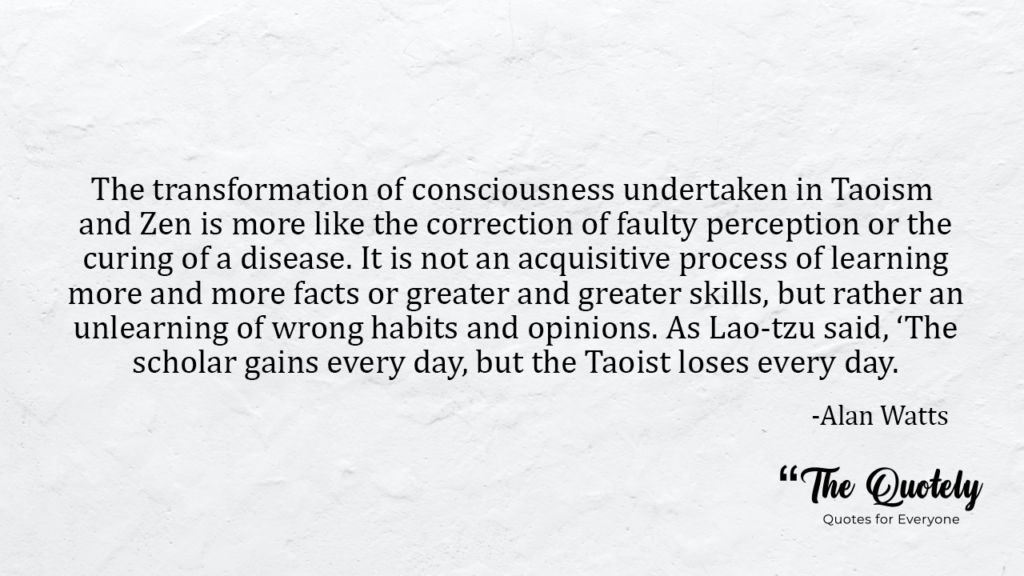
- “The transformation of consciousness undertaken in Taoism and Zen is more like the correction of faulty perception or the curing of a disease. It is not an acquisitive process of learning more and more facts or greater and greater skills, but rather an unlearning of wrong habits and opinions. As Lao-tzu said, ‘The scholar gains every day, but the Taoist loses every day.’”
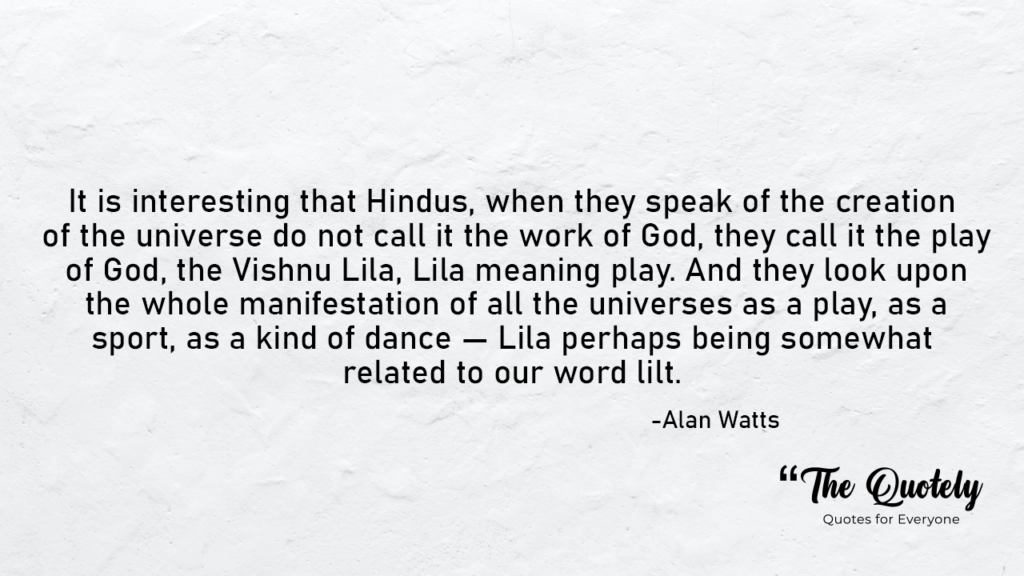
- “It is interesting that Hindus, when they speak of the creation of the universe do not call it the work of God, they call it the play of God, the Vishnu Lila, Lila meaning play. And they look upon the whole manifestation of all the universes as a play, as a sport, as a kind of dance — Lila perhaps being somewhat related to our word lilt.”
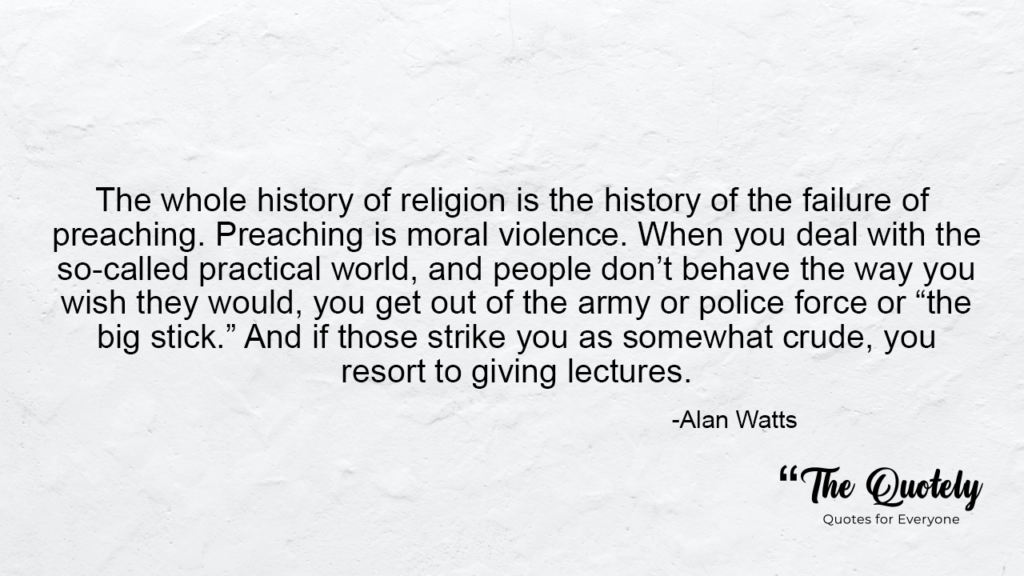
- “The whole history of religion is the history of the failure of preaching. Preaching is moral violence. When you deal with the so-called practical world, and people don’t behave the way you wish they would, you get out of the army or police force or “the big stick.” And if those strike you as somewhat crude, you resort to giving lectures.”
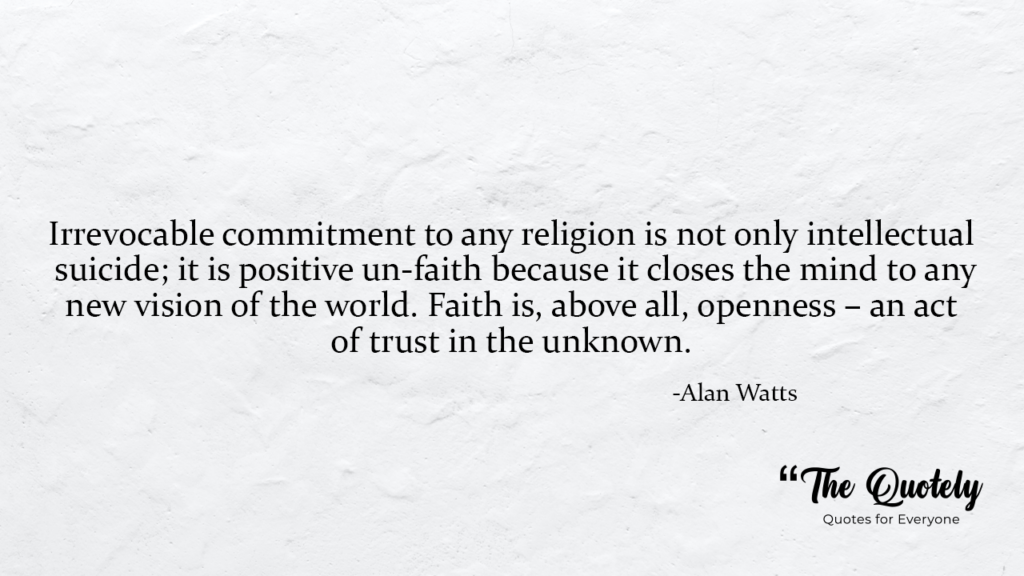
- “Irrevocable commitment to any religion is not only intellectual suicide; it is positive un-faith because it closes the mind to any new vision of the world. Faith is, above all, openness – an act of trust in the unknown.”
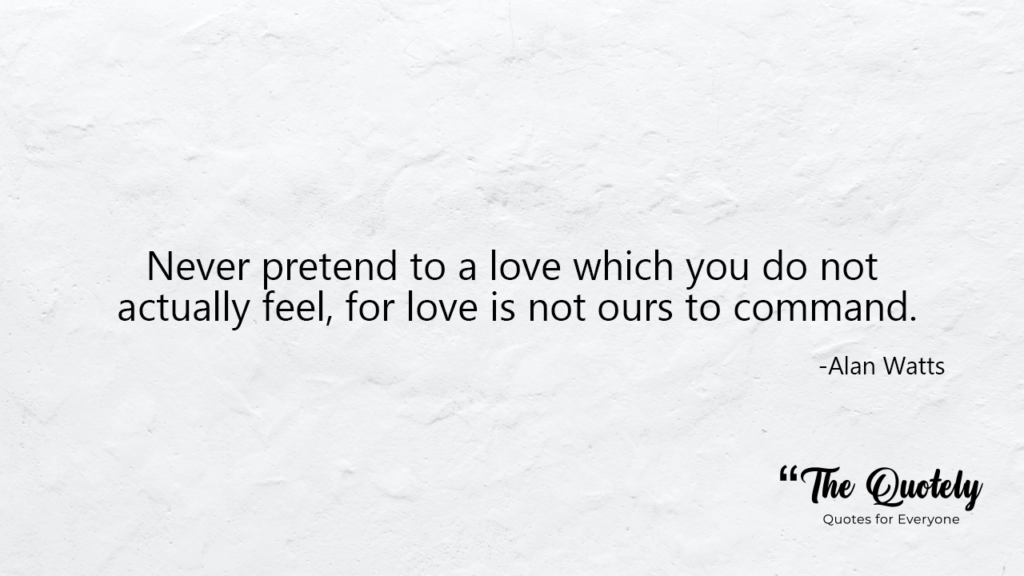
- “Never pretend to a love which you do not actually feel, for love is not ours to command.”
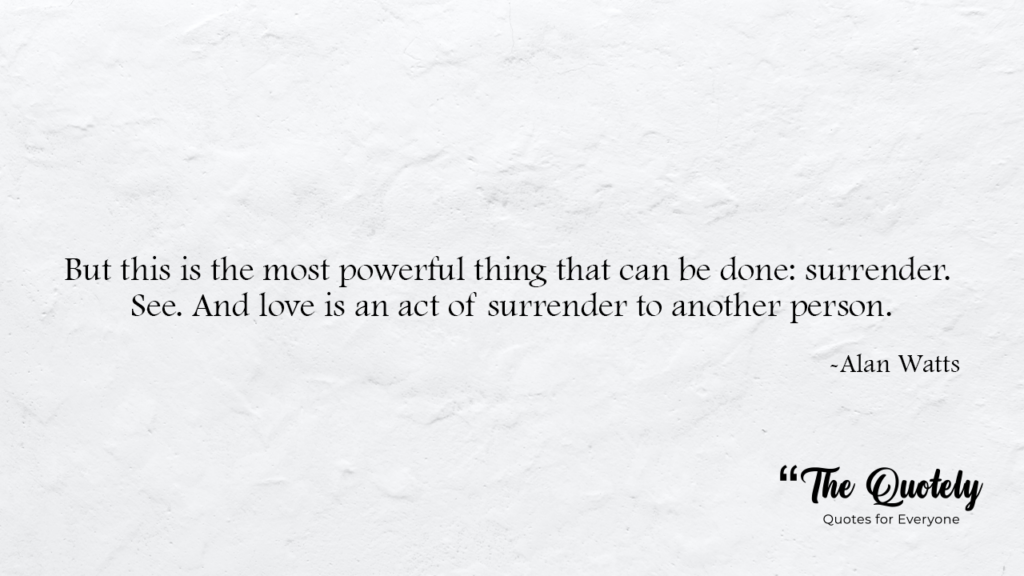
- “But this is the most powerful thing that can be done: surrender. See. And love is an act of surrender to another person.”
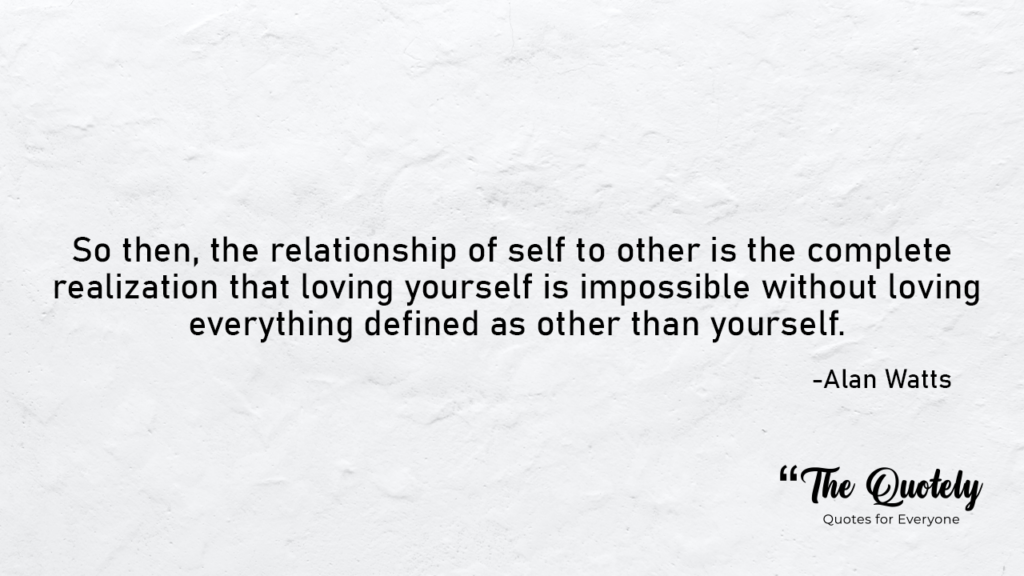
- “So then, the relationship of self to other is the complete realization that loving yourself is impossible without loving everything defined as other than yourself.”
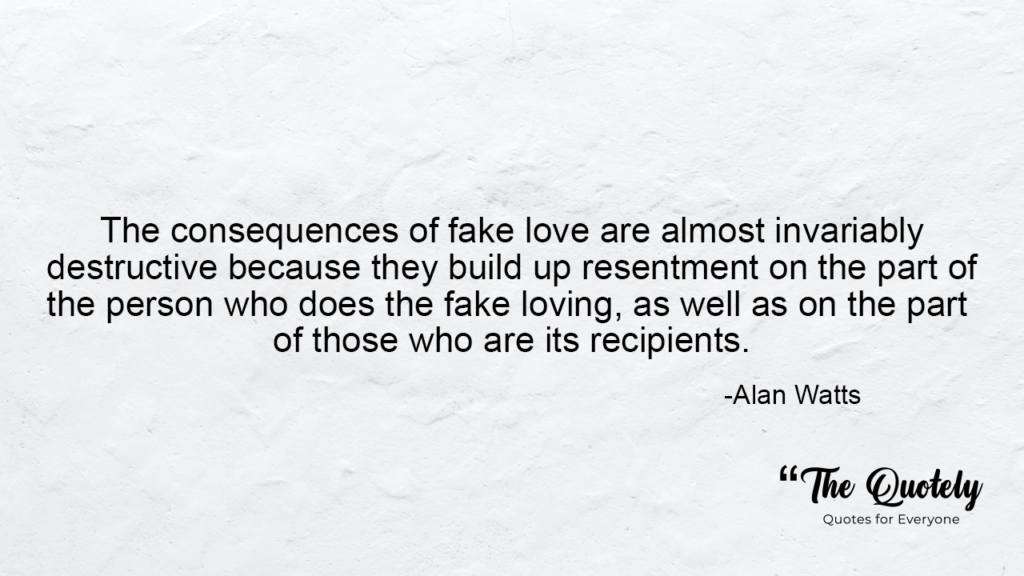
- “The consequences of fake love are almost invariably destructive because they build up resentment on the part of the person who does the fake loving, as well as on the part of those who are its recipients.”
On Love
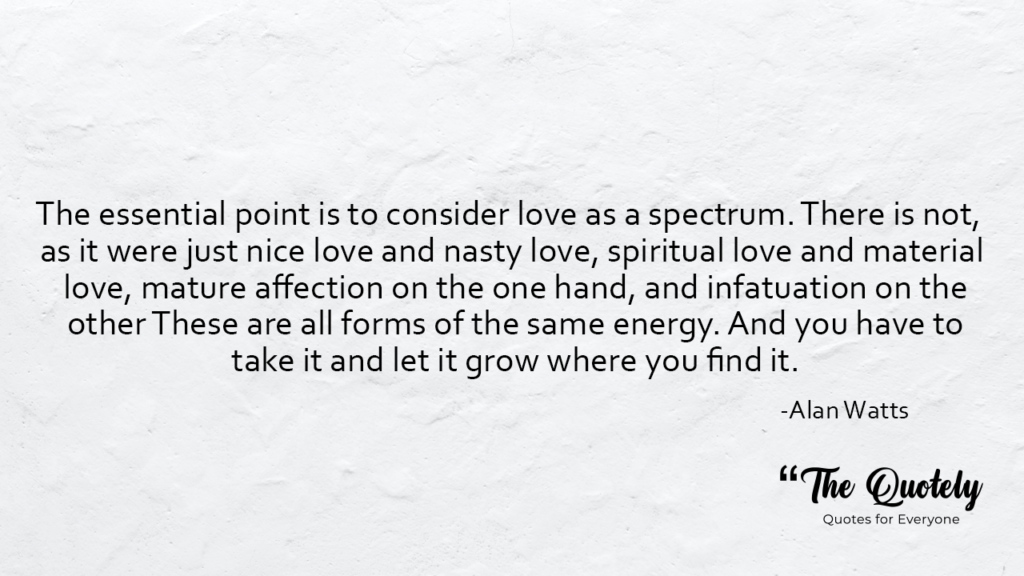
- “The essential point is to consider love as a spectrum. There is not, as it were just nice love and nasty love, spiritual love and material love, mature affection on the one hand, and infatuation on the other. These are all forms of the same energy. And you have to take it and let it grow where you find it.”

- “When you find out that there was never anything in the dark side to be afraid of … Nothing is left but to love.”
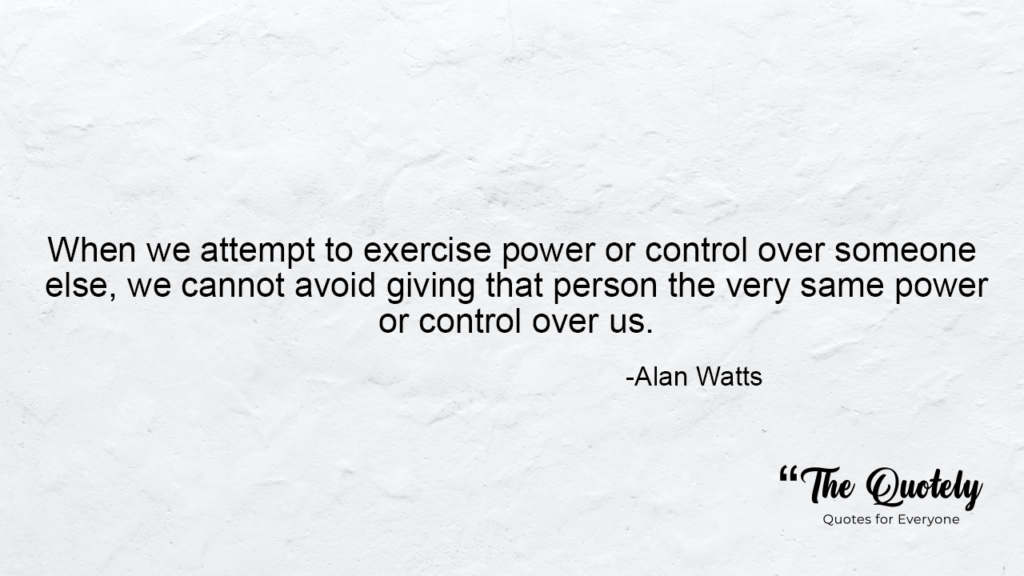
- “When we attempt to exercise power or control over someone else, we cannot avoid giving that person the very same power or control over us.”
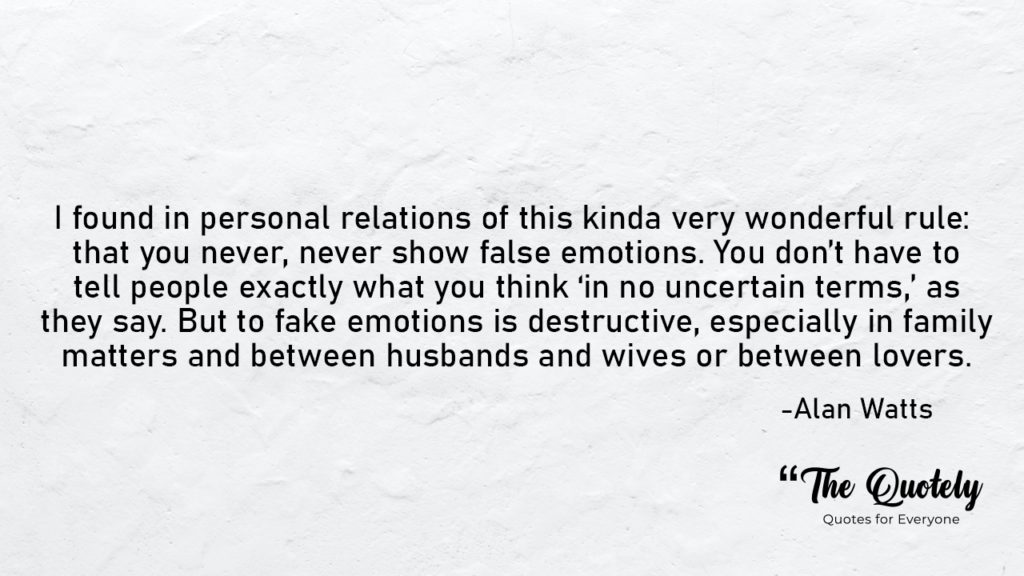
- “I found in personal relations of this kinda very wonderful rule: that you never, never show false emotions. You don’t have to tell people exactly what you think ‘in no uncertain terms,’ as they say. But to fake emotions is destructive, especially in family matters and between husbands and wives or between lovers.”
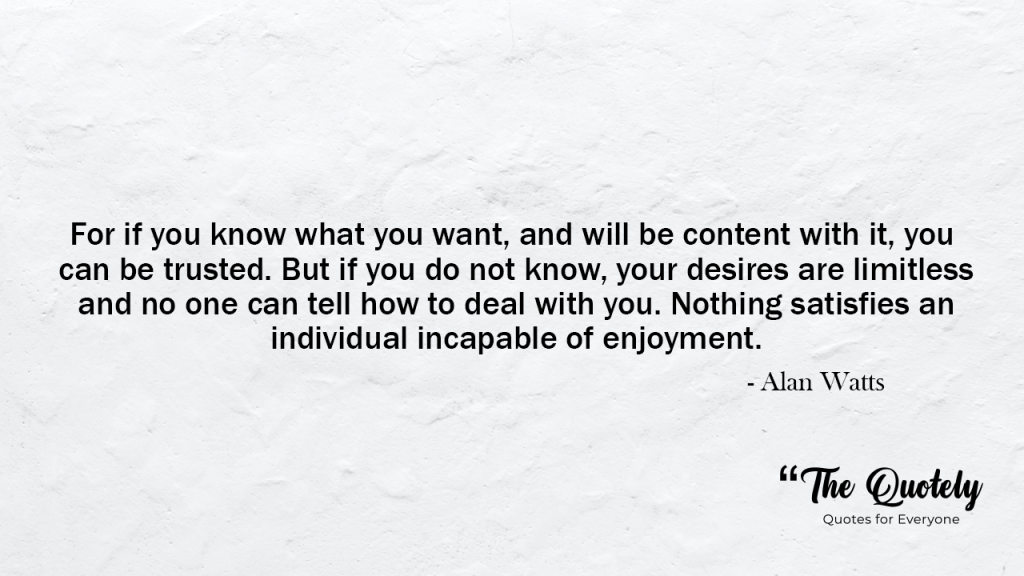
- “For if you know what you want, and will be content with it, you can be trusted. But if you do not know, your desires are limitless and no one can tell how to deal with you. Nothing satisfies an individual incapable of enjoyment.”
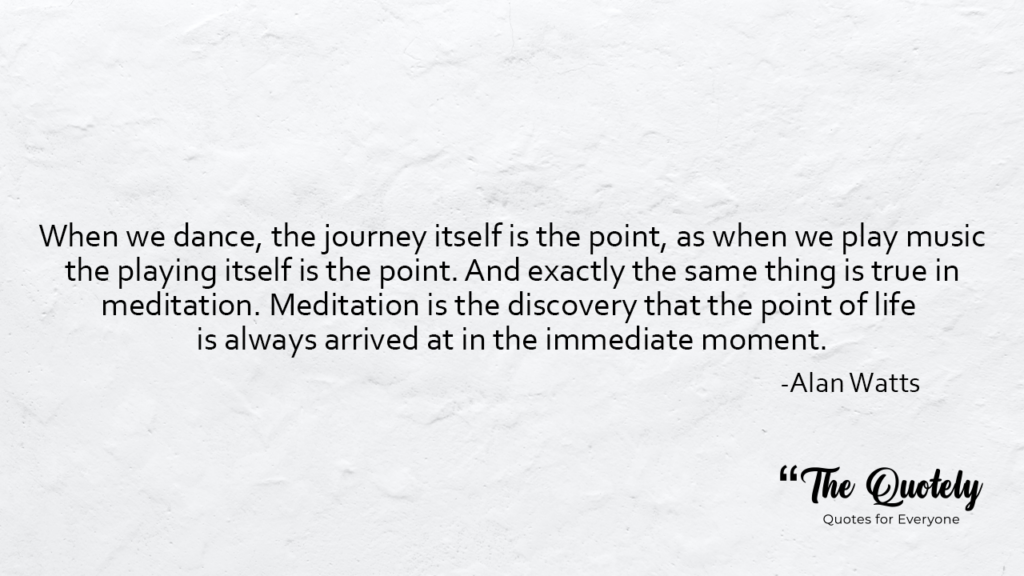
- “When we dance, the journey itself is the point, as when we play music the playing itself is the point. And exactly the same thing is true in meditation. Meditation is the discovery that the point of life is always arrived at in the immediate moment.
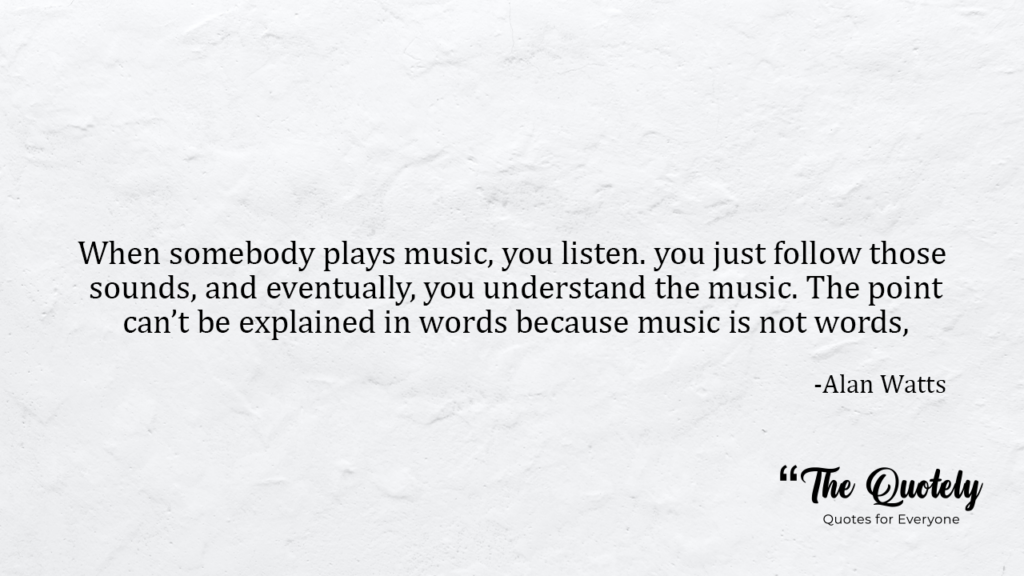
- “When somebody plays music, you listen. you just follow those sounds, and eventually, you understand the music. The point can’t be explained in words because music is not words.
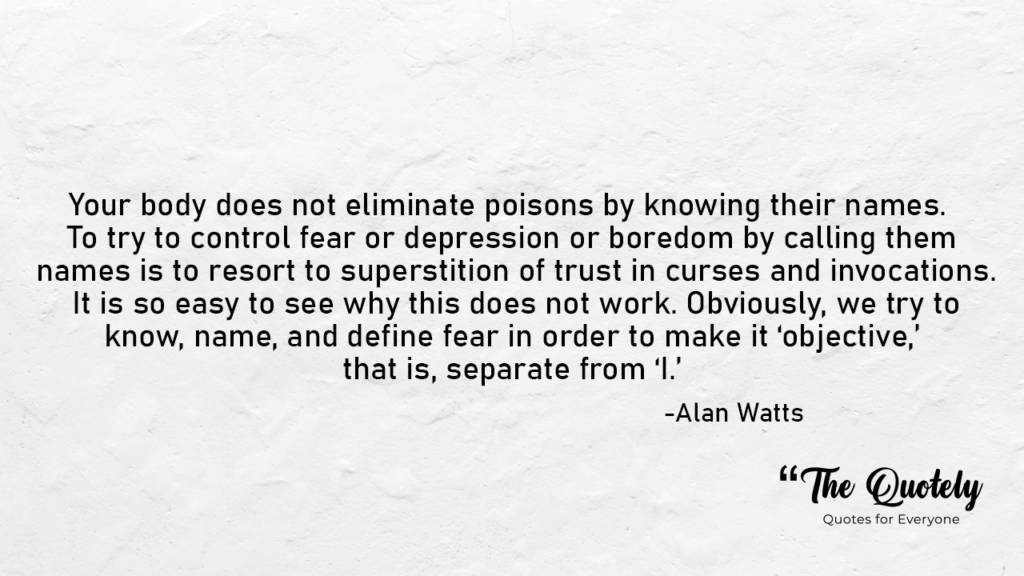
- “Your body does not eliminate poisons by knowing their names. To try to control fear or depression or boredom by calling them names is to resort to superstition of trust in curses and invocations. It is so easy to see why this does not work. Obviously, we try to know, name, and define fear in order to make it ‘objective,’ that is, separate from ‘I.’”
Alan Watts Biography
His birth date was Jan. 6 of 1915. He was born in the English town of Chlesleigh. British philosopher, writer, and speaker: He was a well-known British philosopher, writer, and speaker. He was best known for translating Eastern philosophy for Western audiences. Originally from England, he became interested in Buddhism while he was at King’s School in Canterbury. After that, he became a member of the Buddhist Lodge, where he met many scholars and spiritual masters, who helped him to shape his ideas and learn more about the world around him. At the age of fourteen, he began writing. It was the journal of the lodge where he wrote a lot of his early work.
In 1938, he moved to the United States. He began Zen training in New York City. When he was looking for a job, he went to Seabury-Western Theological Seminary, where he earned a master’s degree in theology. In 1945, Watts became an Episcopal priest. In 1950, he left the ministry and moved to California, where he worked at the American Academy of Asian Studies. At KPFA, which is in Berkeley, Watts worked as a volunteer programmer. He gained a lot of fans in the San Francisco Bay Area because of this job! Watts wrote more than 25 books and articles about religions from both the East and the West. One of the first best-selling books on Buddhism, The Way of Zen (1957), was written by Watts.
Educational Career
There is a school called The King’s School, Canterbury, next to Canterbury Cathedral. Alan Watts went there. Though he was often at the top of his class in school and was given responsibilities at school, he lost out on a scholarship to Oxford because he styled a critical examination essay in a way that was seen as presumptuous and capricious by the people who read it. During his time after high school, Watts worked in a printing house and then a bank. A “rascal guru,” Dimitrije Mitrinovi, taught him how to be a better person when he had time off from work. Watts had a lot of chances to grow as a person because of his work with the Buddhist Lodge in London. Through Humphreys, he got in touch with some of the best spiritual writers. In 1936, when he was 21 years old, he went to the World Congress of Faiths at the University of London to hear D. T. Suzuki read a paper. After that, he was able to meet this well-known scholar of Zen Buddhism.
Buddhism
By Watts’ own account, he was creative, bold, and talkative. In his early years, he was sent away to boarding schools where he learned both academics and Muscular Christianity, which is how he was raised. When he talked about this religious training, he said, “During my schooling, my religious indoctrination was grim and sad.” The wealthy Epicurean Francis Croshaw took Watts on a number of trips to France when he was a teenager. Croshaw had a lot of interest in both Buddhism and exotic, little-known parts of European culture. A Theosophist named Christmas Humphreys was running the London Buddhist Lodge at the time, and he wanted to become a member. He chose Buddhism, and he wanted to become a member of the Lodge. Watts became the secretary of the group when he was 16. (1931). It was during these years that the young Watts tried out a lot of different types of meditation.
Career
In 1931, when Watts was 16, he was made the Secretary of the Buddhist Lodge. People like Dr. Sarvapalli Radhakrishnan, Nicholas Roerich and Alice Bailey were all spiritual authors who he came into contact with at some point during this time. He learned a lot from these people, as well. A Zen teacher in New York did not teach Watts in the way that was right for him. He wasn’t a Zen monk, but he wanted to find a job where he could use his philosophical skills. He went to Seabury-Western Theological Seminary, which is an Episcopal (Anglican) school in Evanston, Illinois. There, he learned about Christian scriptures, theology, and the history of the church. In 1936, he went to the World Congress of Faiths at the University of London. There, he met Daisetsu Teitaro Suzuki, a well-known Zen Buddhist scholar. He had already read his work; the meeting was very interesting to him. The Spirit of Zen: A Way of Life, Work, and Art in the Far East was also written in 1936. It was then called ‘The Legacy of Asia and Western Man’ (1937). He was looking for a job where he could use his spiritual interests. He went to Seabury-Western Theological Seminary, which is an Episcopal (Anglican) school in Evanston, Illinois. Here, he learned about Christian scriptures, theology, and the history of the church.
He also took advantage of the chance to learn both the Chinese language and Chinese brush calligraphy, which is a type of calligraphy. As well as that, he studied many other things, from Vedanta to quantum mechanics and cybernetics, to name a few. Some time ago, he also started taking psychedelic drugs and seeing how they changed his mystical insight. Before anything else, he took mescaline to start. Next, in 1958, he worked with a lot of other people on LSD, taking the drug a lot. In the future, he worked with marijuana and wrote about the effects it had on him in his books.
When he wrote about Chán (Zen) in the 1950s, he said that he was impressed by how practical it was. It had helped farmers, architects, builders, folk medicine practitioners, artists, and administrators to become monks who lived in the monasteries of its lineages. From the early 1960s, he went to Japan a lot. Another time, from 1962 to 1964, he had a fellowship at Harvard University. In 1968, when he went to San Jose State University, he was given a scholarship. In fact, by the late 1960s, he had become a well-known figure in the counterculture, with many fans as well as people who didn’t like him.
Personal life
At the beginning of the year, Alan Wilson Watts was born. In Chislehurst, a small village in Kent, he was born on January 6. His father, Laurence Wilson Watts, worked for Michelin Tyre Company. His mother, Emily Mary Watts, was a housewife. As a child, Watts also wrote about a mysterious dream he had while he was sick with a fever. To help him with his art, missionaries who had been in China gave his mother a lot of Far Eastern paintings and embroideries that he saw when he was young. Three times, Alan Watts got married and had seven kids (five daughters and two sons). In 1936, he met Eleanor Everett at the Buddhist Lodge. They got married in April 1938, and they had two children. In 1950, Watts married Dorothy DeWitt, and they had two children. They had five kids. When Watts went on a lecture tour to New York in the early 1960s, he met Mary Jane Yates King. Their marriage broke up. In 1964, Watts and King married.
Death
One time, he went to Europe and came back to Druid Heights. He stayed at his cabin there. There he died in bed on November 16, 1973. His body was burned, and half of the ashes were buried near his library at Druid Heights, and the other half were buried at the Green Gulch Monastery, where he lived. A library of nearly 400 talks by Watts is still alive and well today. Watts left around 25 books and a library of nearly 400 talks. To meet their ever-growing needs, not only are his books being republished now, but copies of his audio lectures are also being made available in written form for people to read and listen to.
Final Thoughts
I hope you have enjoyed these Alan Watts quotes, but more that perhaps you will take something new away from them. There are many more times ahead to focus on the same theme, I’m sure, so make sure to check out what else we have here on how to further discover how important balance is between people and things in life as a whole can be.






